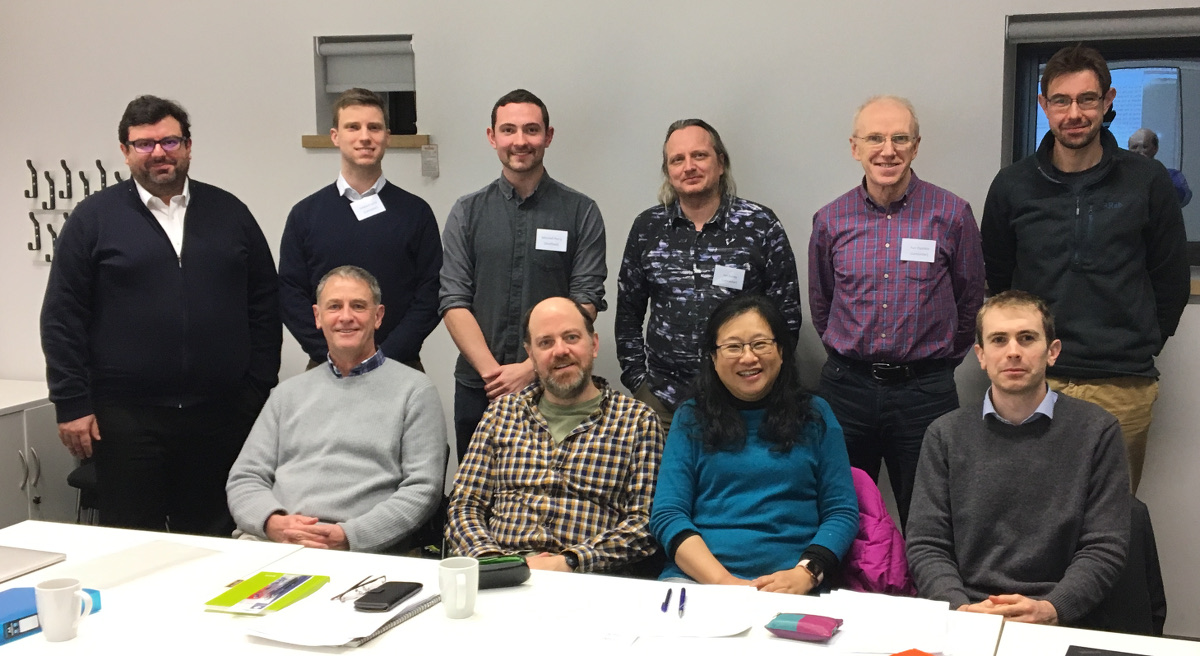January 2025
QSHS Collaboration meeting held on Thursday, 30th January 2025, University College London. QSHS members came together to hear updates from group members, mainly postdoctoral researchers and PhD students. It was also an opportunity to discuss the next steps and future activities of the QSHS project.


Quantum Technology for Fundamental Physics (QTFP) Community Meeting, held at The Mazumdar-Shaw Advanced Research Centre, University of Glasgow, 21-22 January 2025.
QSHS is one of 7 large QTFP consortia funded by UKRI STFC as part of the UK National Quantum Technologies Programme (NQTP). Project members of the 7 large grants and 17 additional projects came together to discuss progress and outcomes across all of the projects. There was opportunity for posters and networking throughout this 2 day event, bringing together the QTFP community to share thoughts, ideas and their views on future direction. Attended by 146 participants from across 28 UK Universities and National labs and 6 overseas institutions. The event was held in memory of Professor Ian Shipsey, who sadly passed away in 2024.
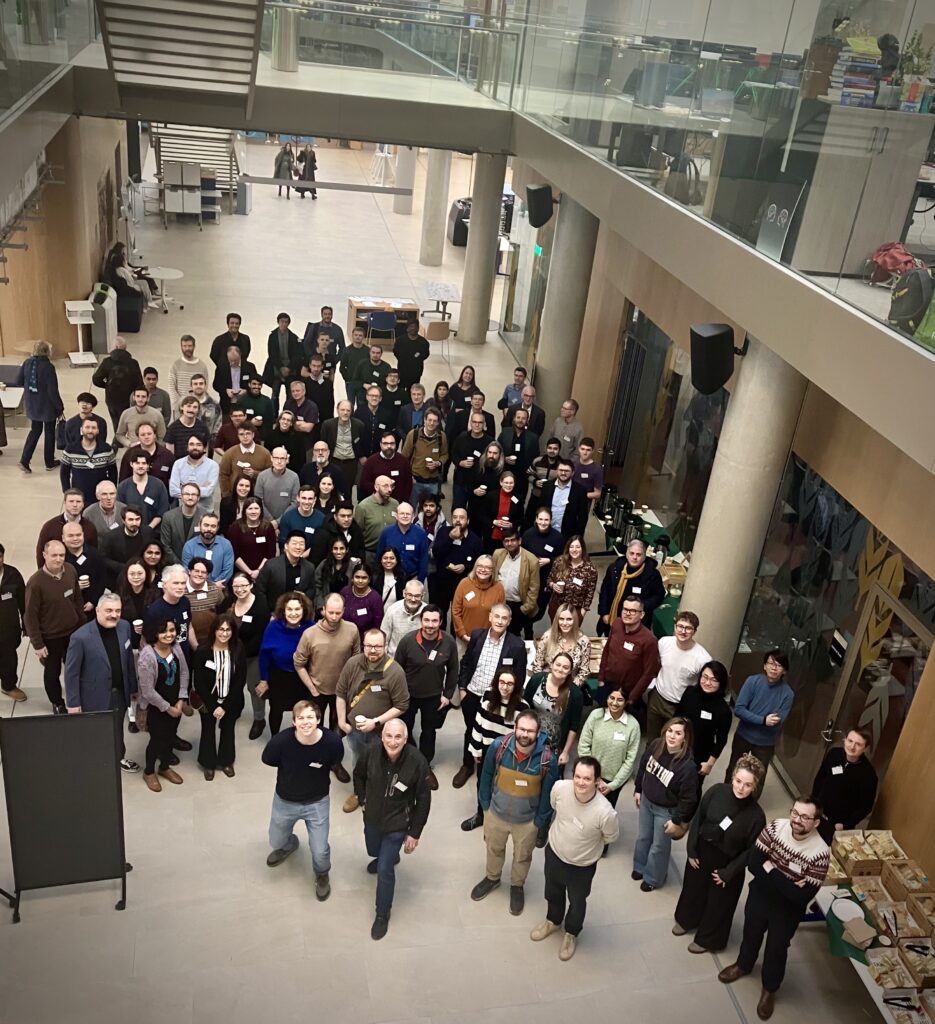
QTFP Community Group photo (courtesy of Professor Robert Hadfield) University of Glasgow.

Joshoua Esmenda, QSHS PDRA, Lancaster University, presenting his poster at the QTFP Community Workshop titled: ‘Surface losses in 3D superconducting microwave cavities’.
December 2024
Festival of the Mind 2024, University of Sheffield, featured Professor Ed Daw combining the arts with science in this musical production. Written in collaboration with Leo Mercer of Leo & Hyde, the performance is a light-hearted and whimsical riff on particle physics, the dark matter problem, axions and the QSHS research. The video is now available to watch: Inside Out – A Dark Matter Musical.
November 2024
Professor Ed Daw’s blog, Listening for a whisper in a crowded bar: the search for axions. Professor Ed Daw, The Quantum Sensors for the Hidden Sector talks axions, dilution refrigerators and new training opportunities at the Unversity of Sheffield. Published by Oxford Instruments Nanoscience (part of the Oxford Instruments Group).
Read the NanoScience Blog
Share on LinkedIn
UK National Quantum Technologies Showcase 2024, 8th November 2024
QSHS exhibiting at this event.
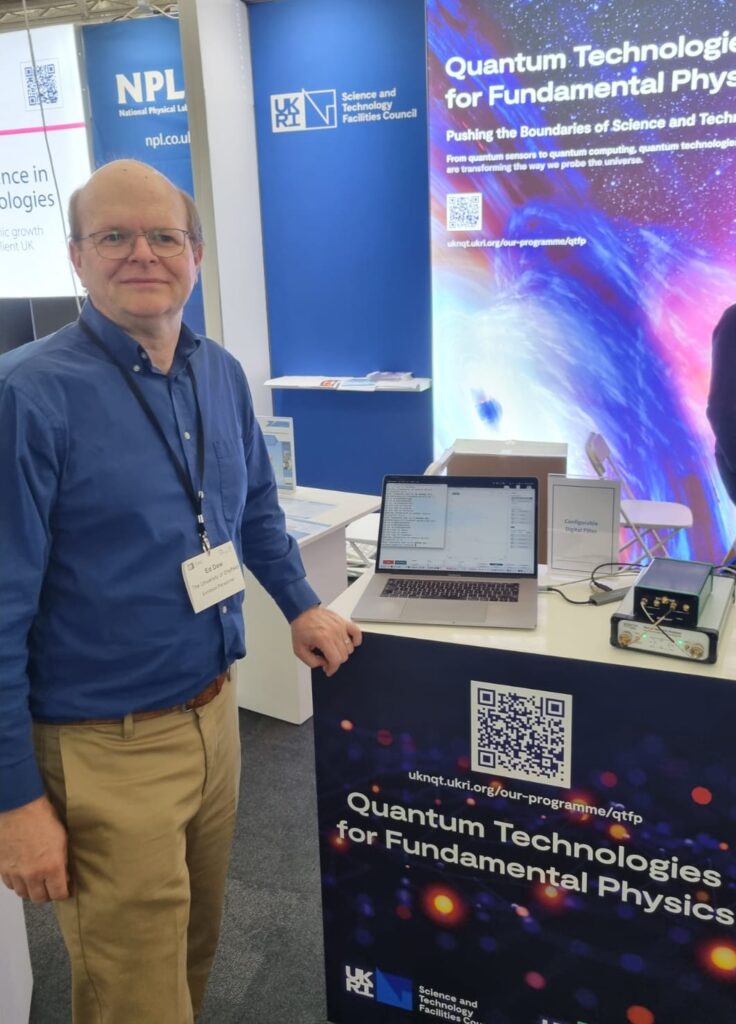
Professor Ed Daw demonstrates a prototype digital filter box capable of high bandwidth control applications for high frequency filters at the 2024 UK National Quantum Technologies Showcase, London.
Can Axions Save the University? New York Times: Hunting in the Dark

“Any day we could make a discovery, because we’re just slowing tuning that frequency’, Dr Rybka said recently.
Read full Article
Dr Gray Rybka, is the ADMX principal investigator of the QSHS collaboration.
October 2024
Sheffield host a visit from Dr Nick Du, Lawrence Livermore National Laboratory (LLNL)
Ed Daw’s group were delighted to welcome Nick Du from LLNL to the Sheffield Lab for testing the Livermore Aluminium cavity containing a niobium tin (Nb3Sn) coated niobium tuning rod in the Sheffield apparatus. Nick said: The goal of this first was to demonstrate the operation of a hybrid resonator using superconducting Nb3Sn and Aluminium for axion dark matter searches. The resonator was developed through the combined efforts of several institutions including University of Sheffield, University of Florida, Lawrence Livermore National Labs, and Fermilab. The results so far have been promising, and we hope this is just a first step towards integrating this device into a dedicated axion dark matter search.
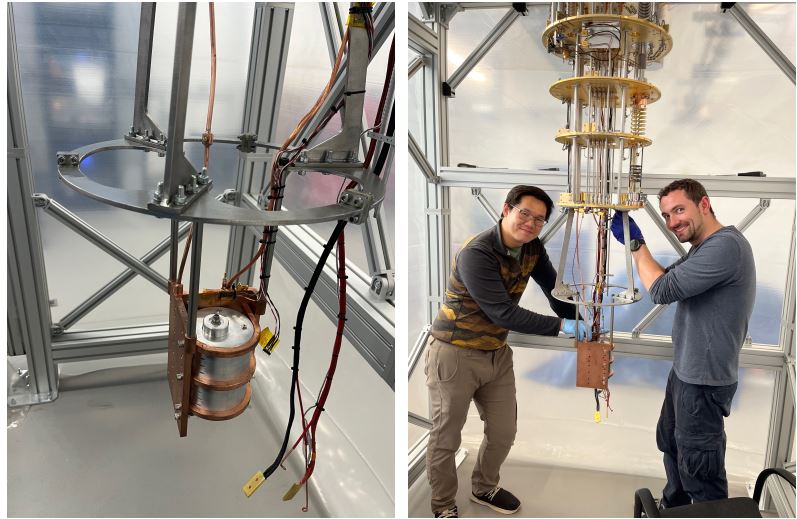
Official Opening of the Sheffield Ultra Low Temperature Facility, University of Sheffield
We are delighted to report that the Sheffield Ultra Low Temperature Facility is officially opened. The event was attended by over 50 guests, and included a QSHS Overview talk by Professor Ed Daw.
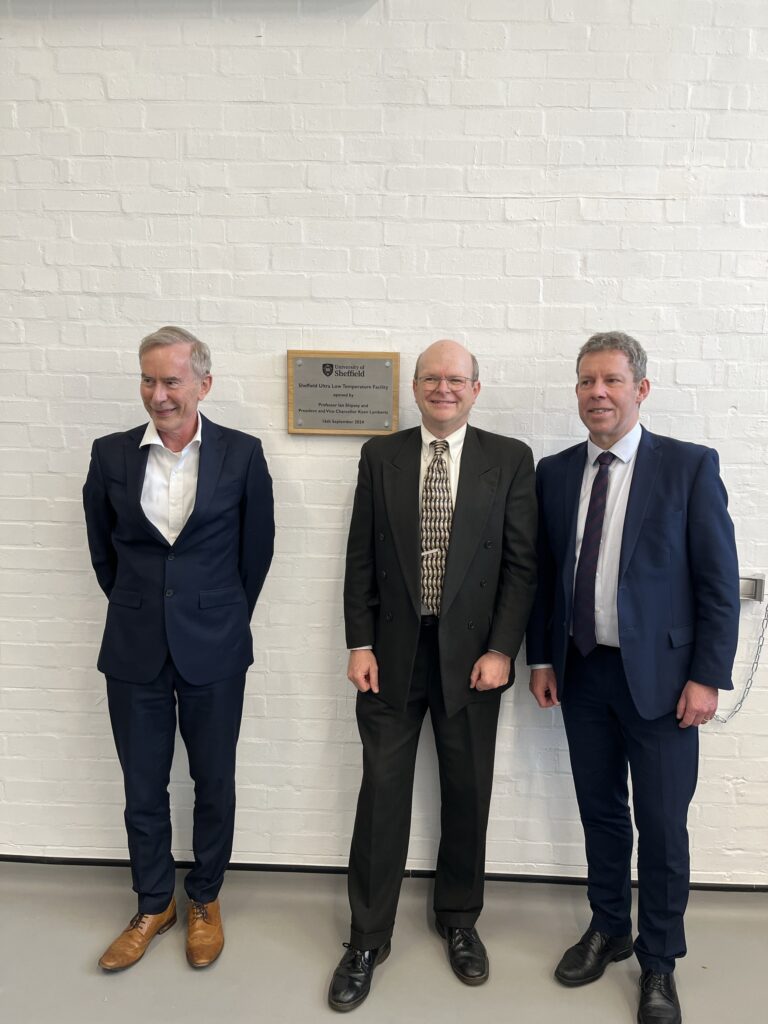
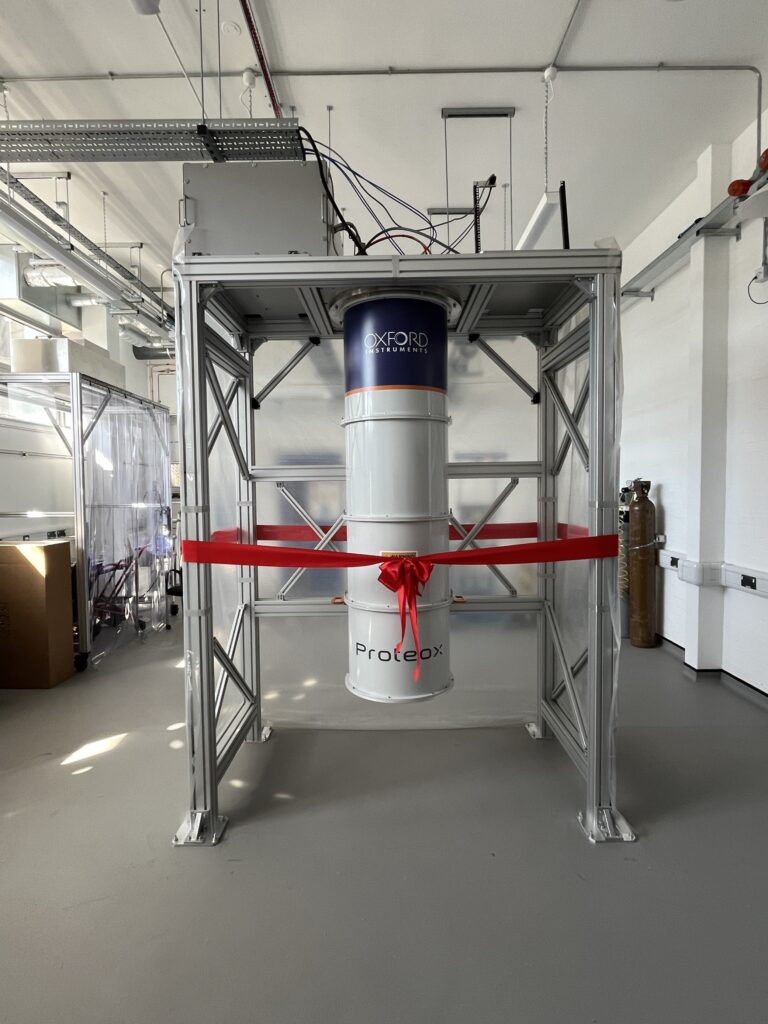
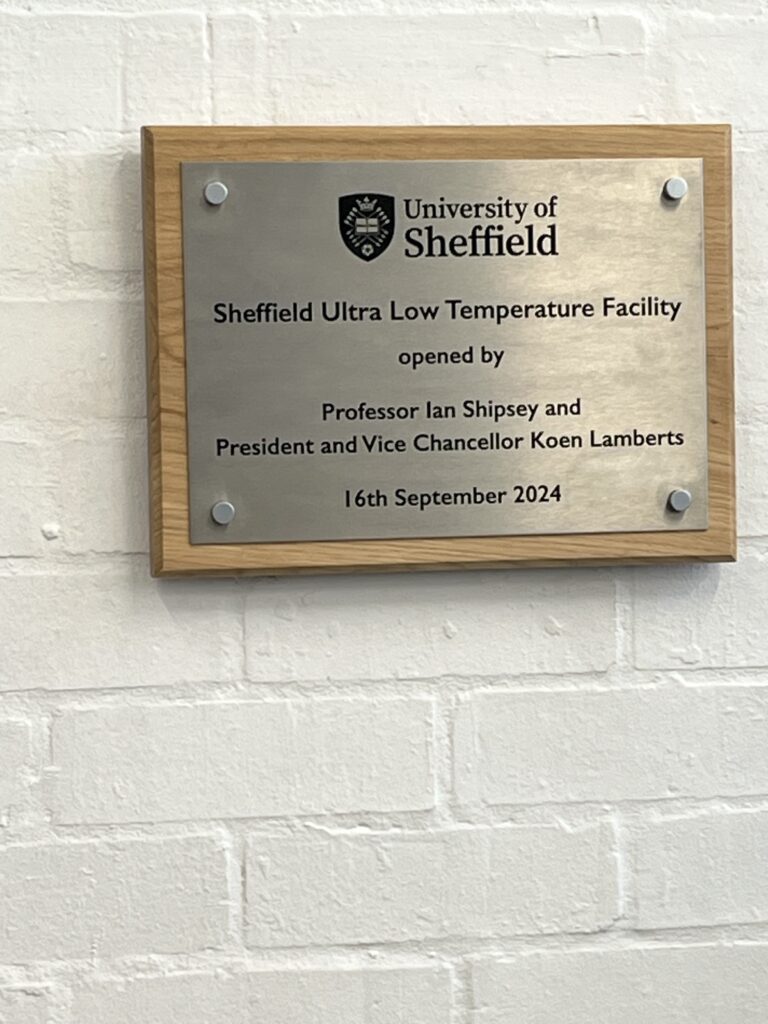
News coverage of the formal opening is widely publicised. See below for links:
Inside Quantum Technology News
September 2024
Institute of Physics reference Sir Keith Burnett’s article in The Times Higher Education (published on 20th September 2024) in X. Sir Keith Burnett is the Chair of the QSHS Oversight Committee.
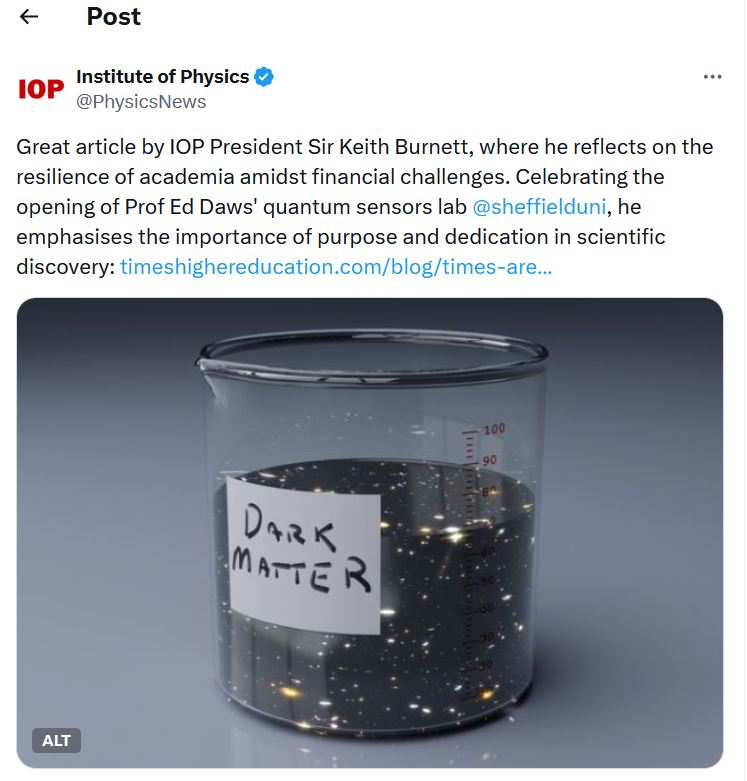
Registration opens for the National Quantum Technologies Showcase.
8th November 2024, Business Design Centre London
Registration and exhibitors can be found here.
Representation by QSHS will be located at the Quantum Technologies for Fundamental Physics (QTFP) desk, feel free to drop by and say hello.
August 2024
Research Directions publicises QSHS ‘Summary of Our First Year’ poster to the Quantum Technology community in X.

July 2024
QSHS at IDM2024, L’Aquila, Italy, 8-12 July 2024
Mitch Perry, QSHS PhD student, attends the IDM2024 conference, in the beautiful city of L’Aquila, Italy, where he presented an update on QSHS activities and explained the QSHS Test Facility in the new Ultra Low Temperature Laboratory at Sheffield.
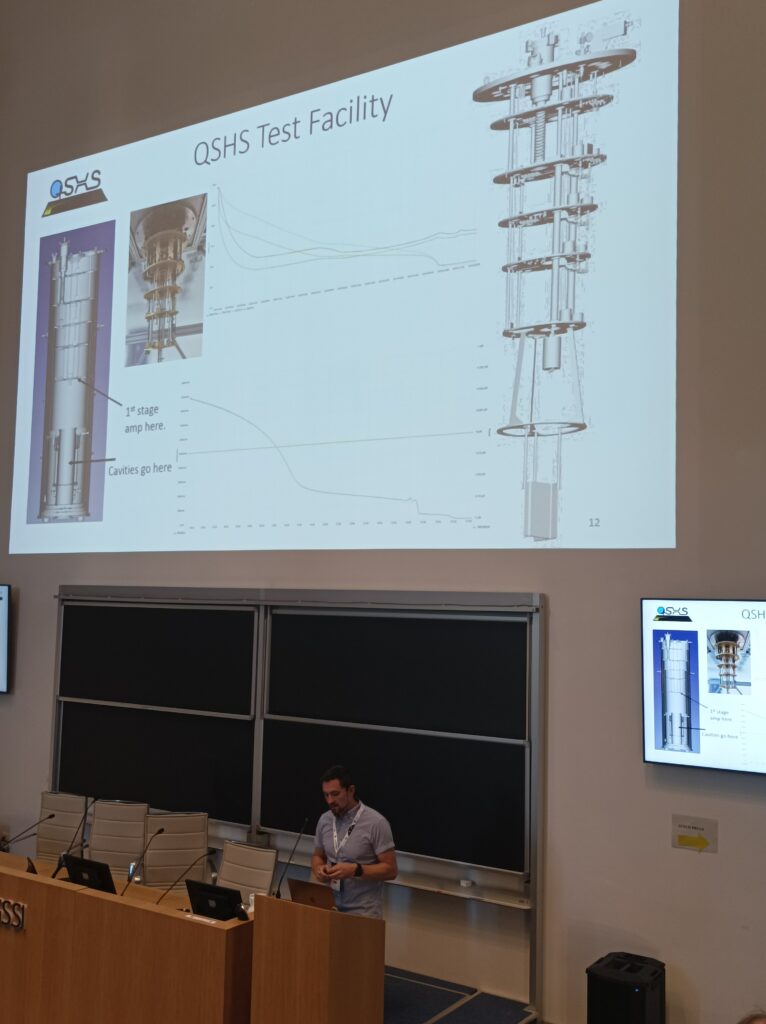
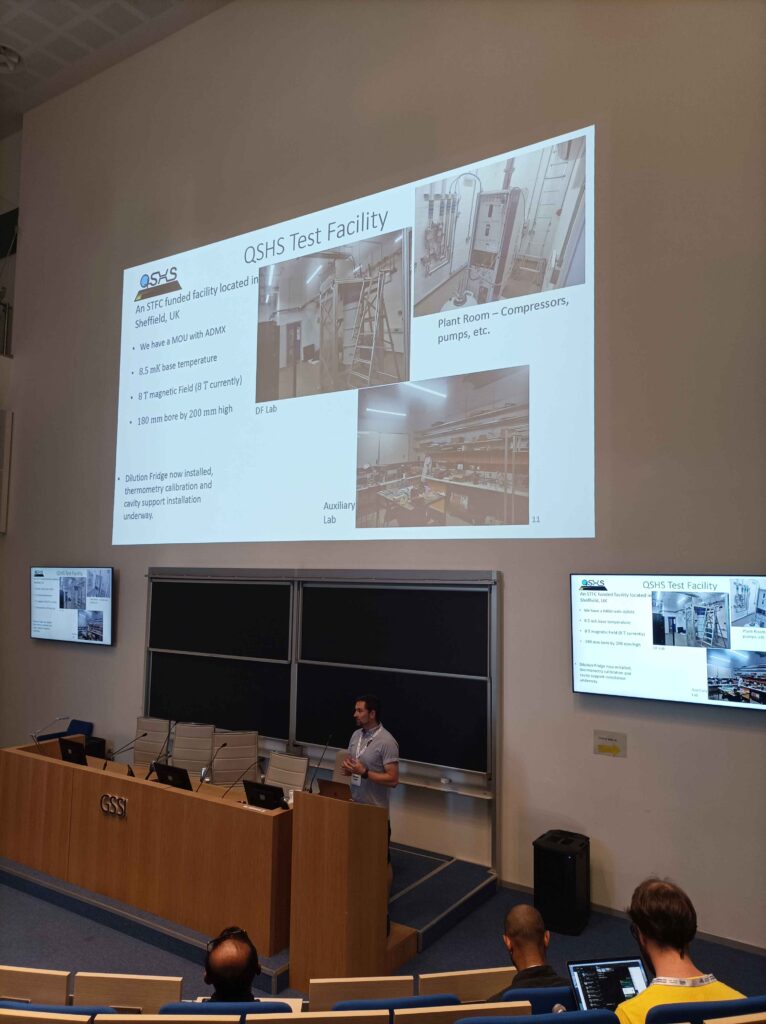
Royal Society Summer Exhibition – 2nd-7th July 2024
Professor Ed Laird, Lancaster University, attends the Royal Society Summer Exhibition. More information on the event can be found at the Royal Society website
Watch this video by Hamster Productions for more information on the search for axions, featuring the Lancaster QSHS group and QSHS project lead, Professor Ed Daw.
A short follow-up on Dark Matter Simulation and Detection using the Lancaster Haloscope model is available at this youtube video.
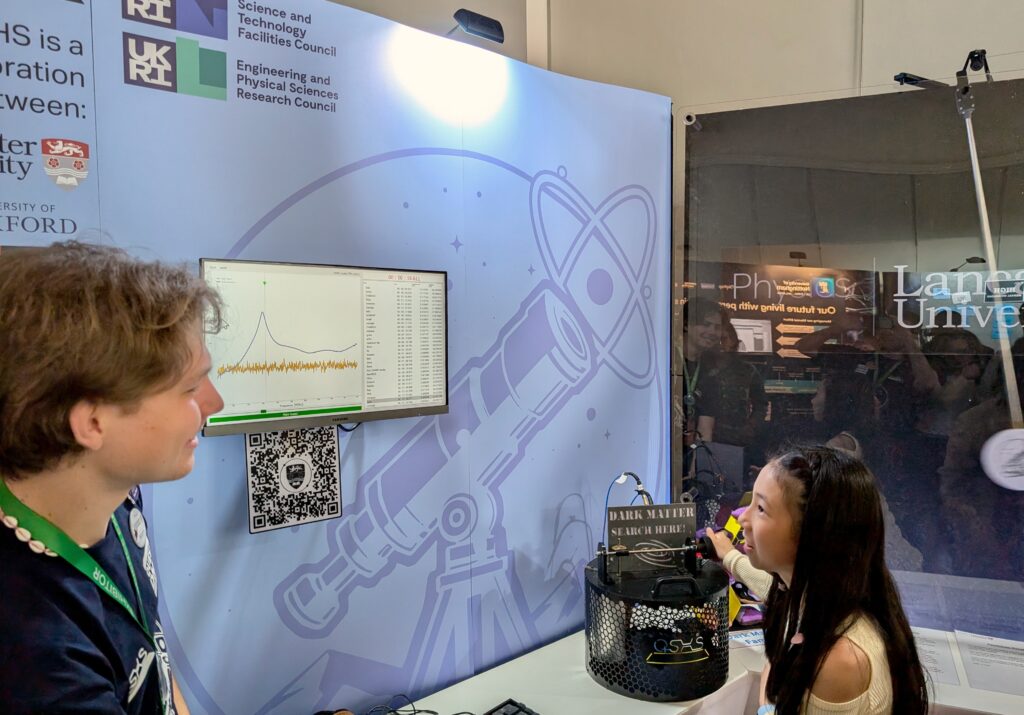
June 2024
QSHS Collaboration Meeting, held Thursday 20th June, 2024, Sheffield
QSHS members came together on Thursday, 20th June 2024, to hear updates on progress at each of the institutions and discuss planned publications/next steps. The meeting was held in Sheffield; the group (pictured below) were given a tour of the new laboratory facilities and apparatus. It was great to see everyone, thanks to all who attended in person and to members who joined remotely.
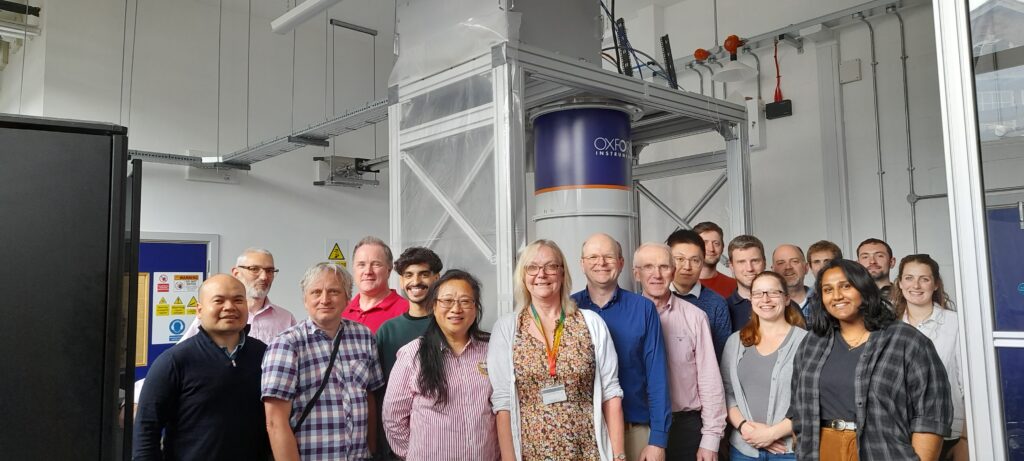
Left to right: Joshoua Esmenda, Paul Smith, Ian Bailey, Phil Meeson, Ahmed Alsulami, Ling Hao, Angela Warren, Ed Daw, Tian Bai, Tom Godfrey, Ed Laird, Michele Piscitelli, Ed Romans, Ed Hardy, Annora Sundararajan, Mitch Perry, Gemma Chapman.
UKRI Talent Peer Review College Round 9 & 10 Recruitment Call
For further information – visit the UKRI website using the link below:
May 2024
CERN AT 70 – CERN will be celebrating its 70th anniversary on 29 September 2024!
All members of the community are encouraged to join in the celebrations through comms, events and outreach activities. Let UKatCERN@stfc.ukri.org know if you are organising an event and use the hashtag #CERN70 to promote any activities or comms on social media. For more information on CERN70 please visit: https://cern70.cern/
April 2024
PRESS RELEASE BY UNIVERSITY OF SHEFFIELD
Dilution refrigerator which will support research into quantum technology unveiled
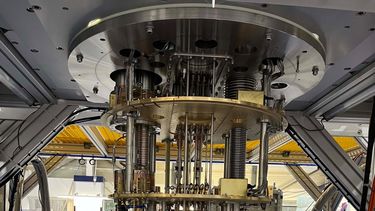
A dilution refrigerator which can provide an ultra-low temperature environment close to zero to support research into dark matter has been unveiled in the Department of Physics, University of Sheffield.
Manufactured by Oxford Instruments, the apparatus will permit experiments at a temperature a hundredth of a degree centigrade above absolute zero, allowing precise measurements of nature in its quantum regime, and searches for axion dark matter.
Funded by UK Research Councils (UKRI) through the Science and Technology Facilities Council (STFC), it is the first closed cycle dilution refrigerator at the University of Sheffield.
The refrigerator will be utilised by the Quantum Sensors for the Hidden Sector collaboration, led by Professor Ed Daw, who is also the group principal investigator in Sheffield.
As well as searching for axions, the refrigerator will be used to make precise measurements of the performance and properties of quantum electronics devices such as amplifiers, power sensors, and engineered two-state quantum systems called qubits.
There will also be opportunities for PhD students and undergraduates to gain experience in ultra-low-temperature physics and the operation of dilution refrigerators, a skill highly relevant to growth areas in industry such as quantum instrumentation and quantum computing.
Professor Daw said: “It is really exciting to be starting to operate a dilution refrigerator here at Sheffield, and I anticipate many interesting and ground-breaking applications.
“There aren’t so many facilities like this in the North East, so it is also wonderful to be instrumental in some real levelling up!
“I hope what we do in our lab will be of benefit to the wider community, both at our own University, and through our collaborations with other institutions across the UK and internationally.”
March 2024
Installation of the Oxford Instruments Proteox Dilution Fridge and Magnet (6T) is complete. Staff training has gone well and the fridge has successfully cooled to base temperature.
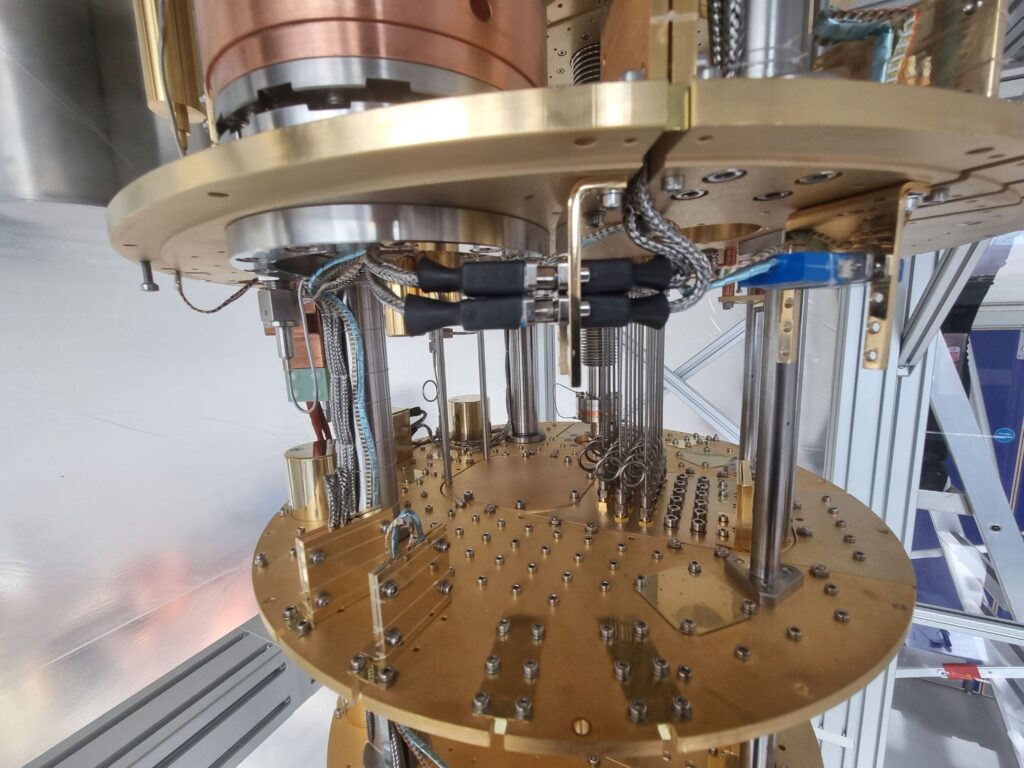

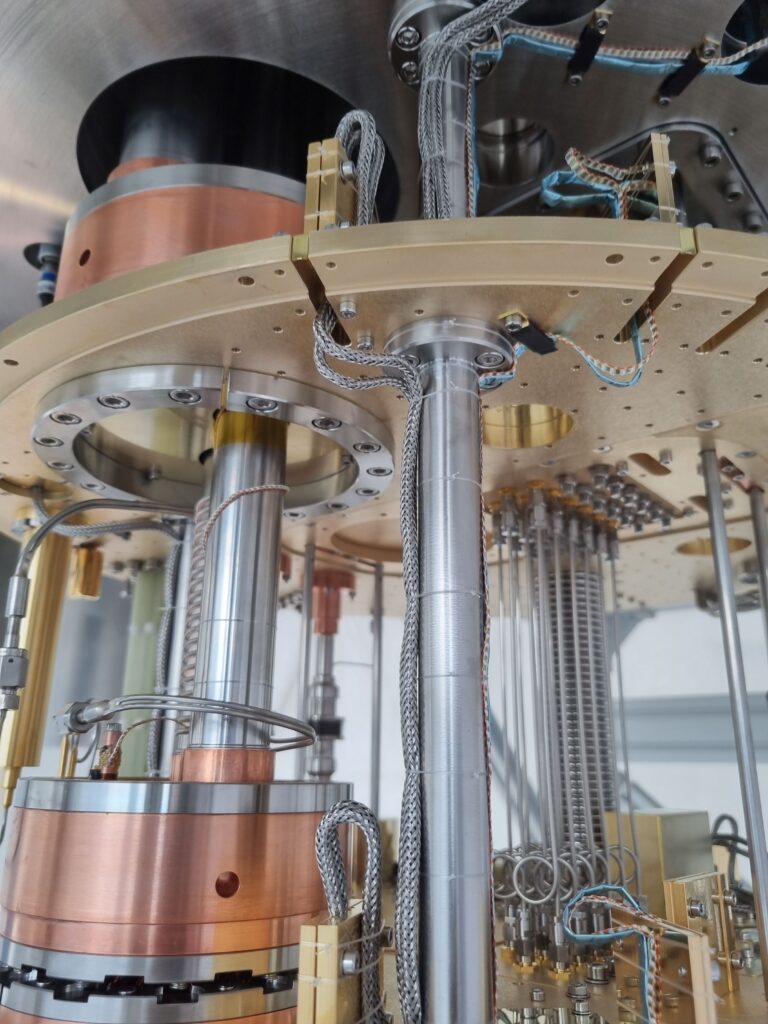
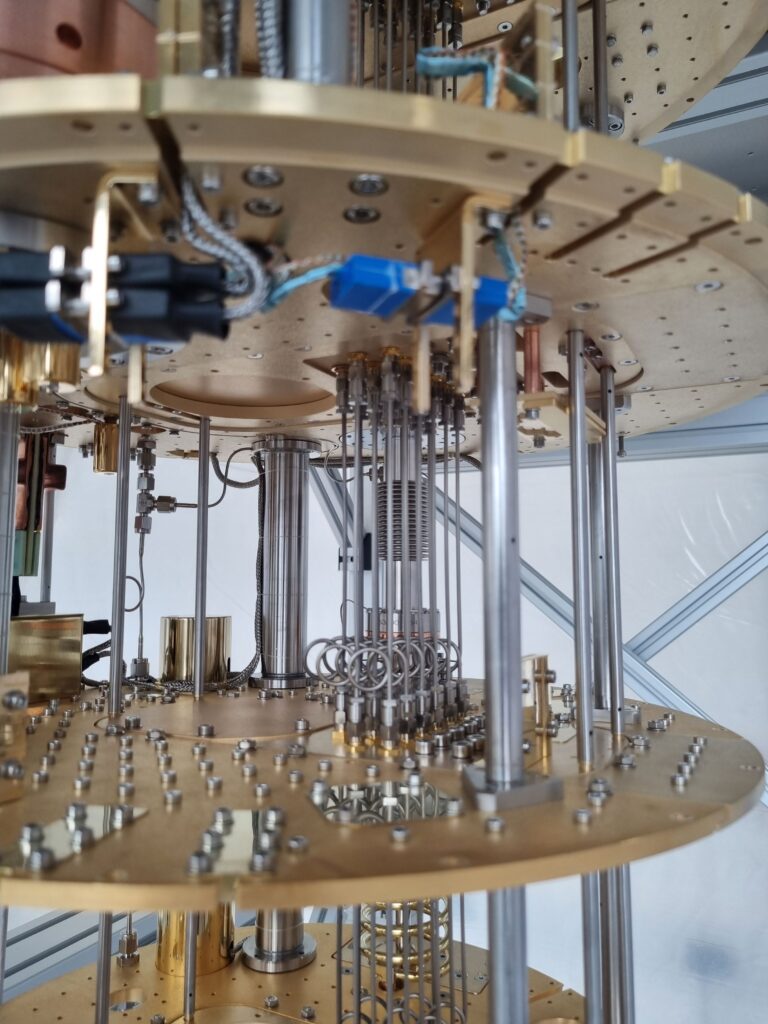

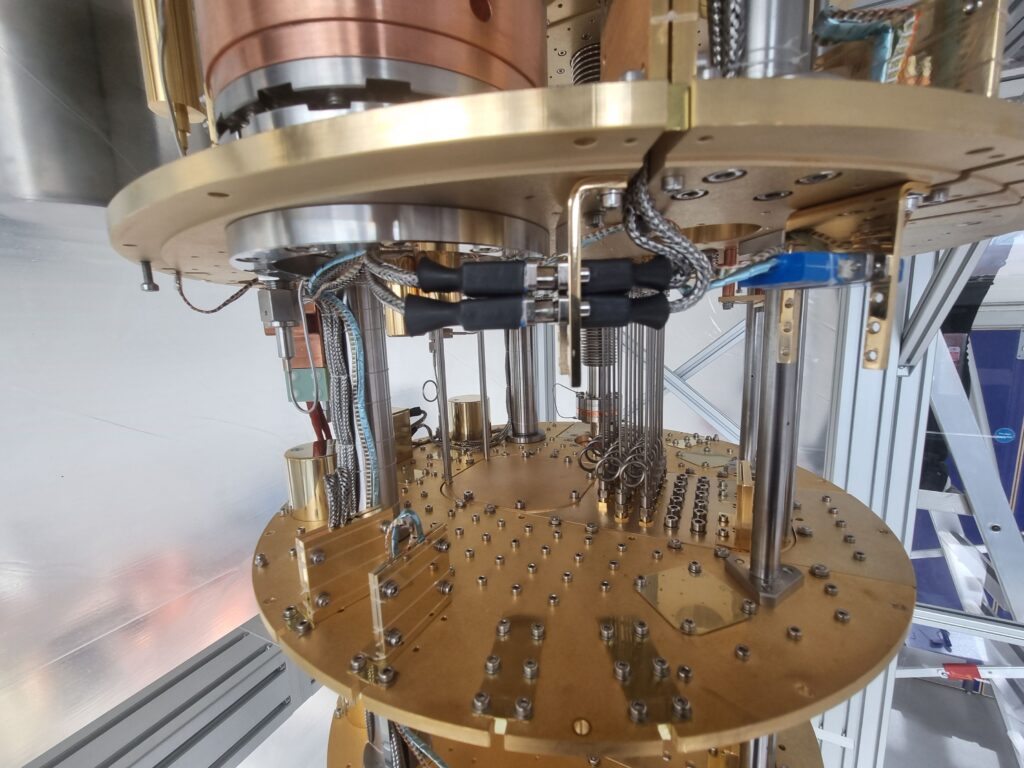
Photos above (courtesy of Paul Smith, PDRA, QSHS project).
February 2024
The Proteox dilution fridge has arrived. Work begins on the installation, thanks to Oxford Instruments engineers Stefanos, Jack and Joe. More pictures to follow as work progresses.
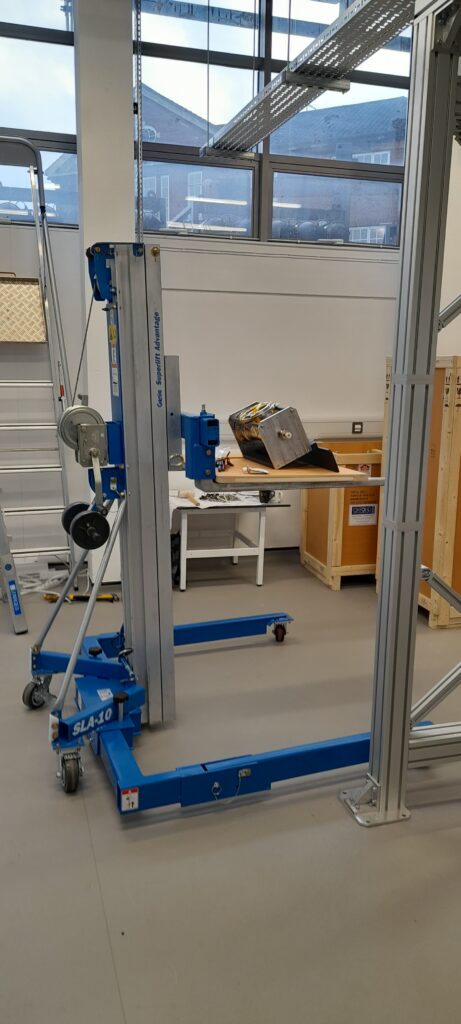

QSHS project collaboration achievements so far include:
- Successful procurement of a dilution refrigerator and magnet.
- Creation and refurbishment of laboratories for the Sheffield instrument.
- Design and fabrication of resonant cavities for QSHS and our ADMX collaborators.
- Design of the insert fixture to hold the QSHS experiment cavity array.
- Design of magnetic field shield hardware to house quantum electronics under test.
- Deployment of a QSHS resonator on the ADMX experiment.
- Development of several prototype devices suitable for installation on the test stand.
- Development of further quantum devices based on a variety of other quantum technologies.
- Successful and deepening collaboration with the U.S. ADMX collaboration.
Oxford Instruments progress on the dilution refrigerator can be seen below. The schedule delivery is end of February/early March 2024.

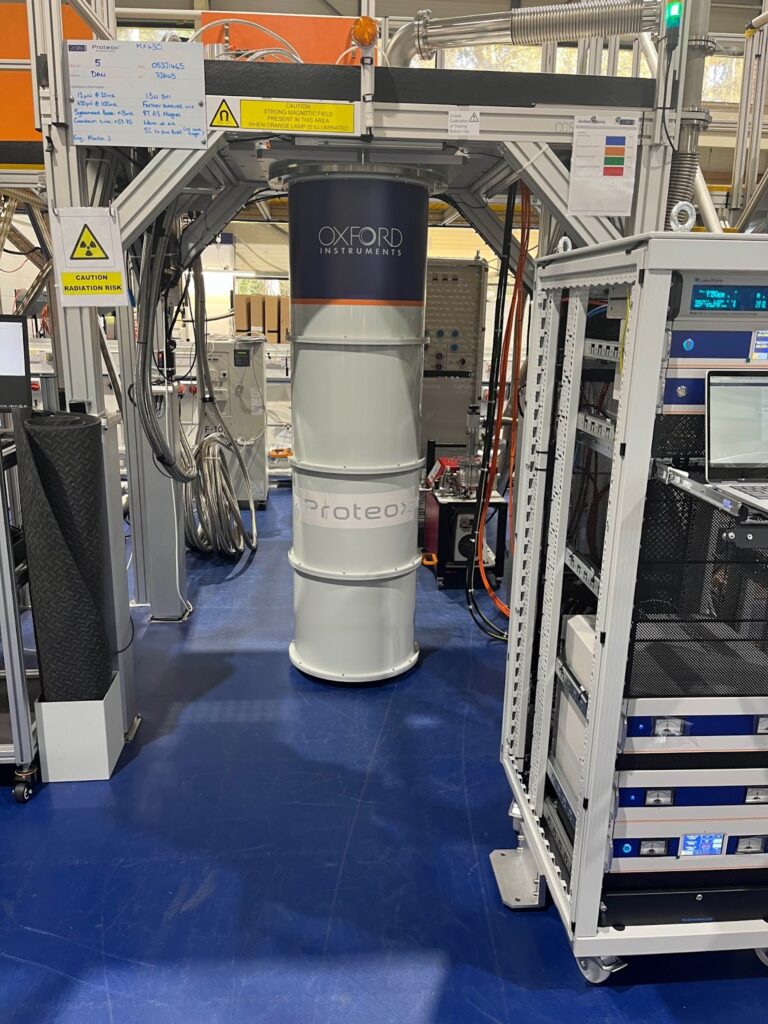
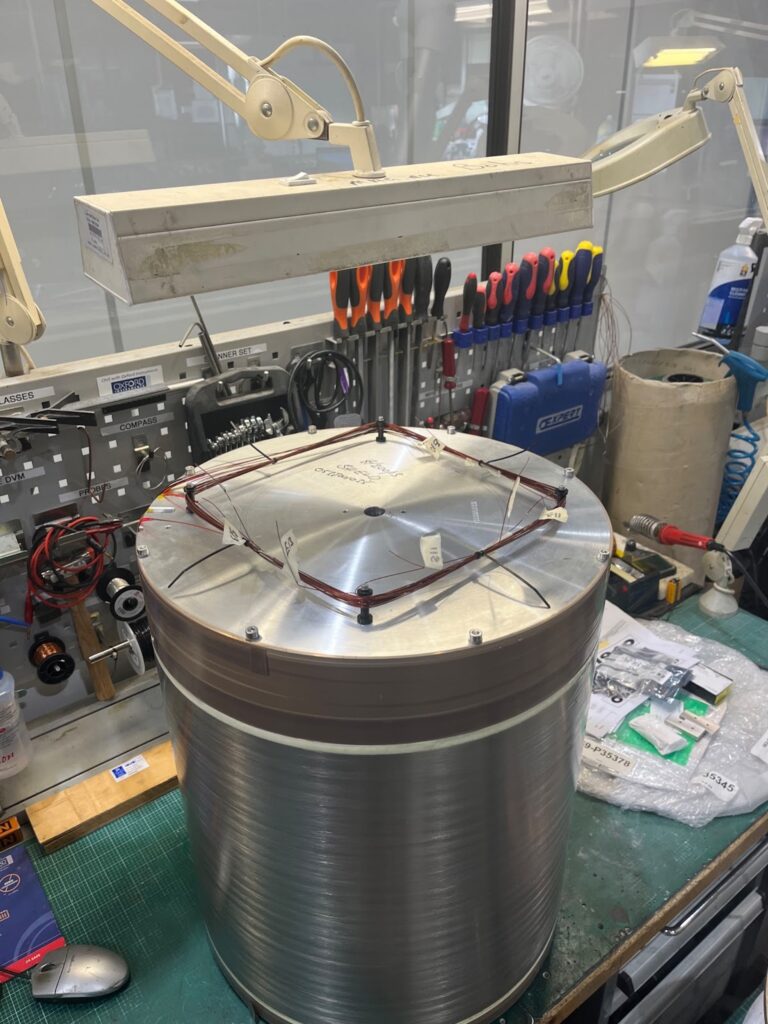
January 2024
We are pleased to start the new year with some good news – the QSHS project will take delivery of the Oxford Instruments Dilution Refrigerator in February/March 2024. The University of Sheffield have invested over £200k in the renovation of a special-purpose laboratory space to house the dilution fridge, and provided adjacent auxiliary lab space for the QSHS group. The two labs pictured below are 9m by 7m and 7m by 5m, respectively, and 4.2m tall. There are dedicated chilled water and mains circuits to compressors, pumps and magnet power supply. A mounting frame, supplied by Oxford Instruments, has been installed in the new laboratory in the Hicks Building, Sheffield, in preparation for delivery of this major equipment.
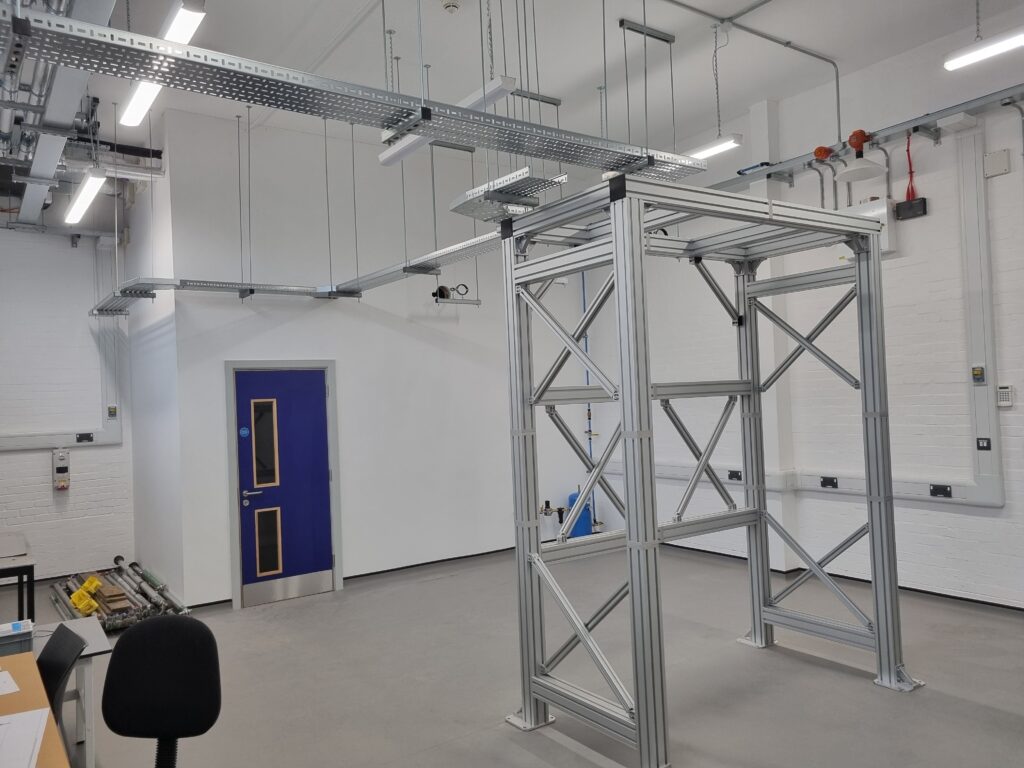
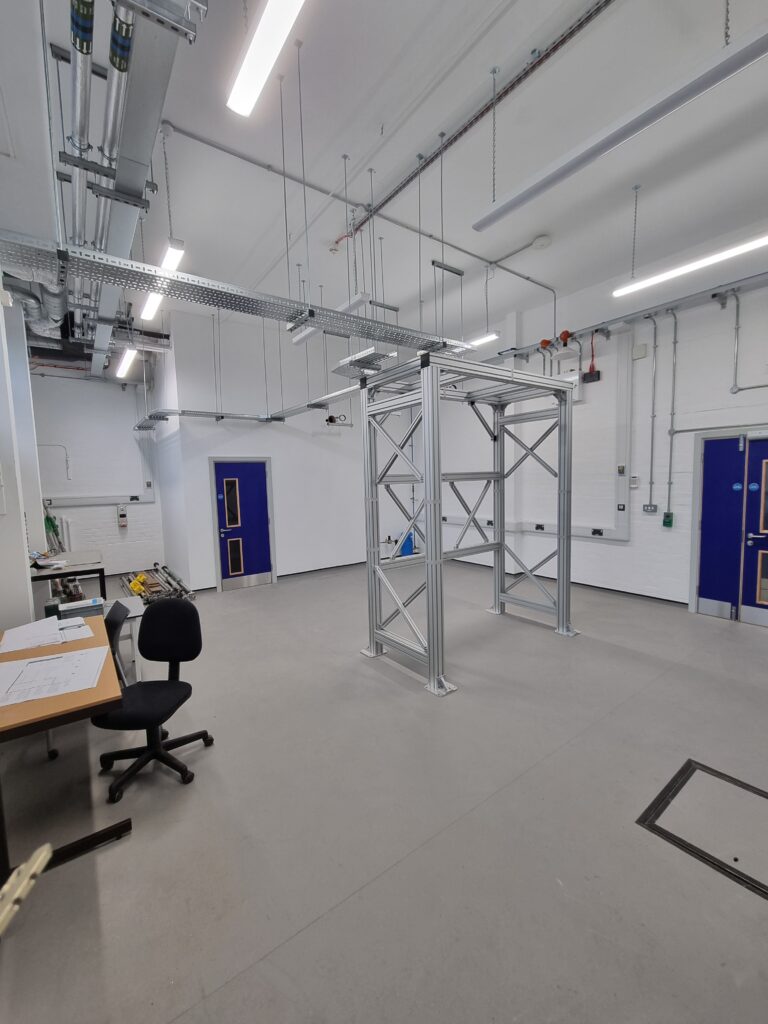
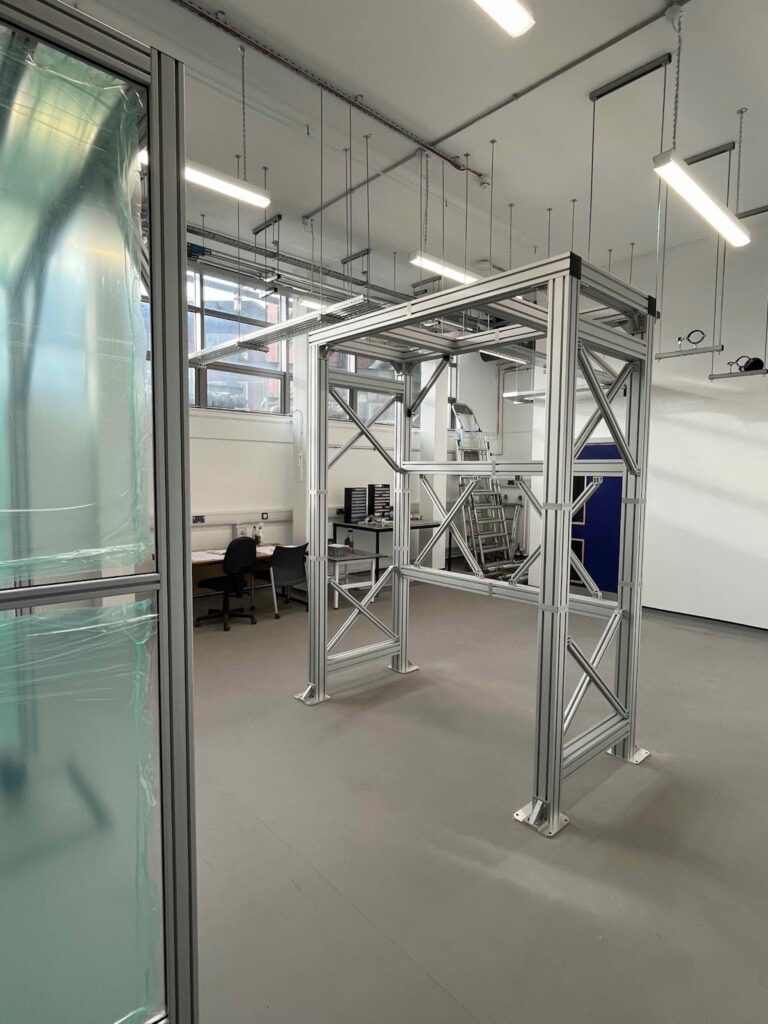

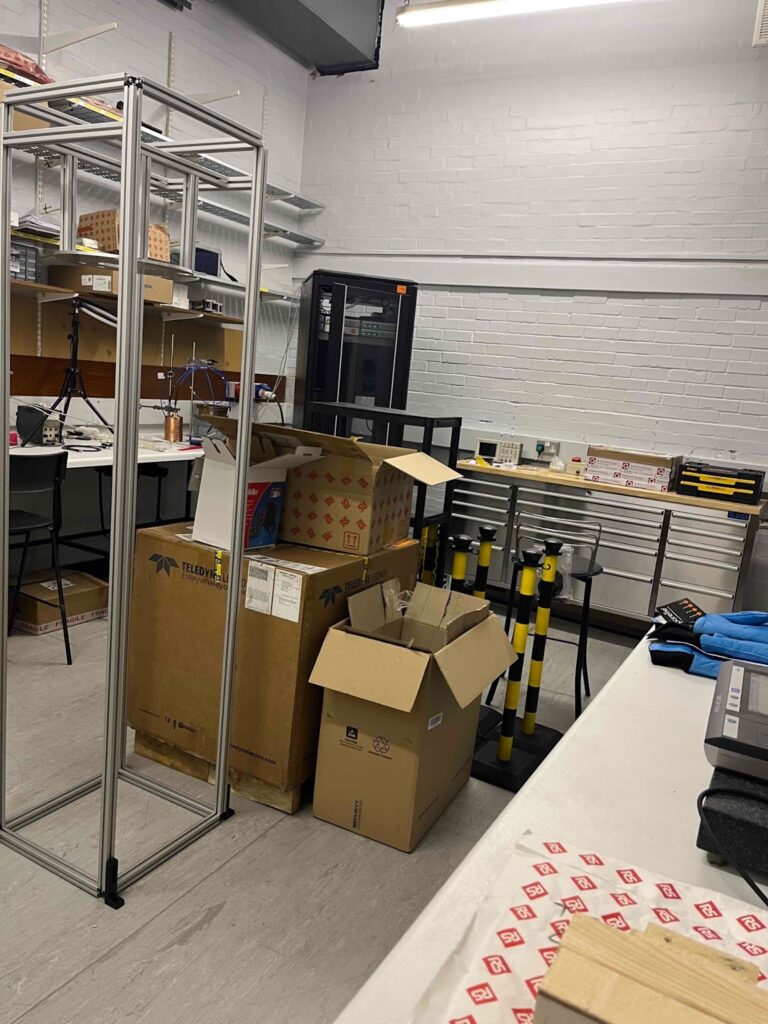
Staff are looking forward to receiving the equipment – further updates will be announced in due course.
December 2023
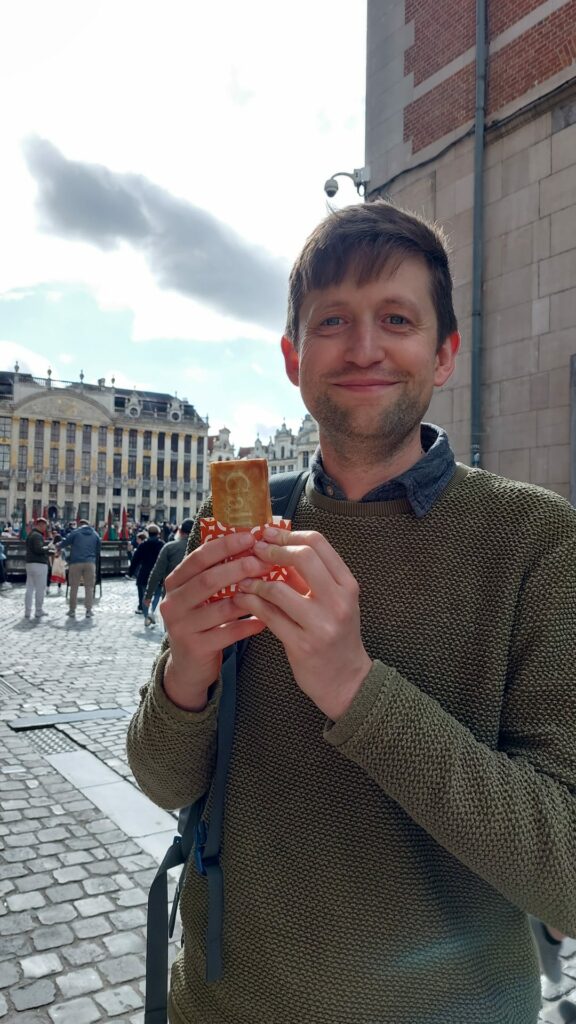
QSHS welcomes Postdoctoral Researcher, Dr Tom Godfrey, who joins the QSHS team at University College London. Tom completed an MEng in Electrical Engineering from the University of Glasgow and studied for a PhD at UCL researching Dispersive readout of inductively coupled nanoSQUIDs. He is now appointed as a post-doctoral research assistant working on SLUG amplifiers for the QSHS project.
November 2023
Exploring the landscape of Quantum Technology: QSHS atttends the National Quantum Technologies Showcase event, held at the Business Design Centre, London, on 2nd November 2023. Thanks to Claude Mostyn, Yuri Pashkin and Joshoua Esmenda for exhibiting at the Quantum Technologies for Fundamental Physics Stand. Pictured is Claude discussing the QSHS project with delegates from New Zealand. More on the event can be found at: https://iuk.ktn-uk.org/events/uk-national-quantum-technologies-showcase-2023/
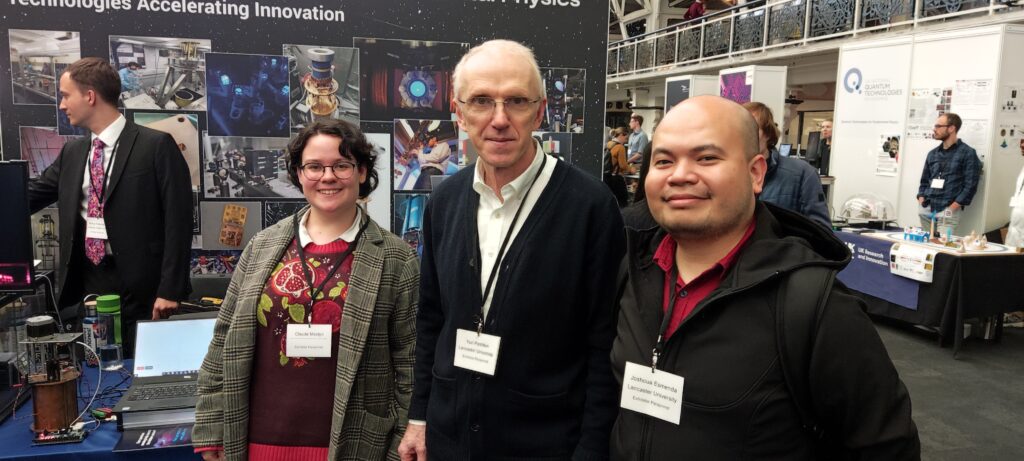
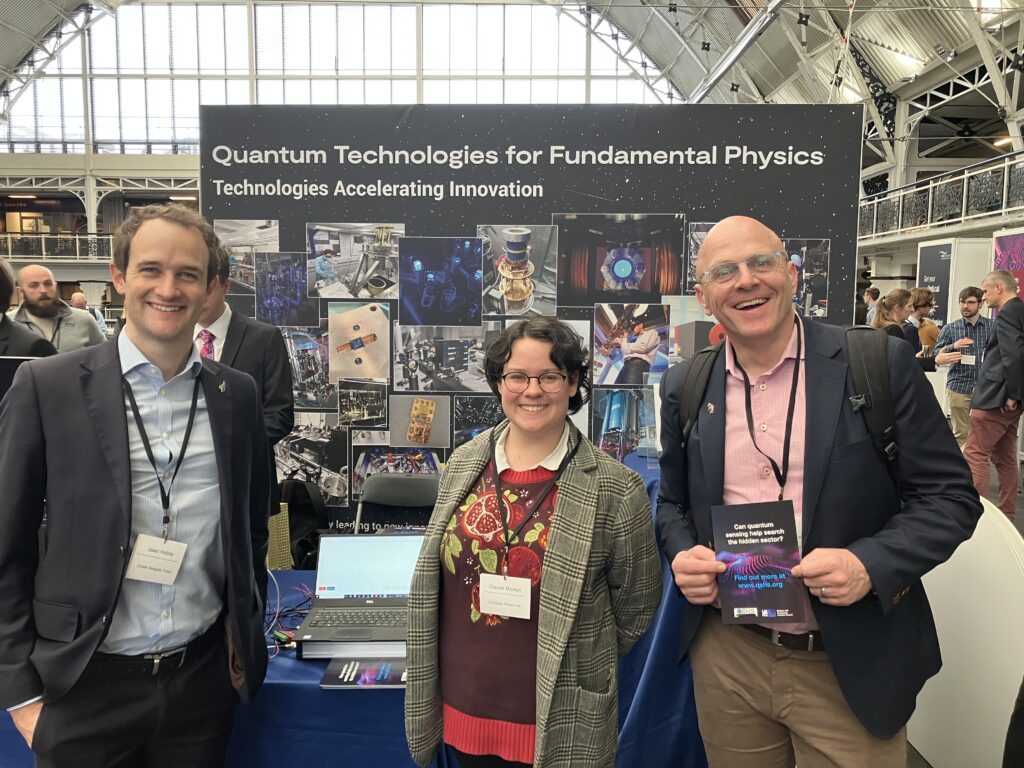
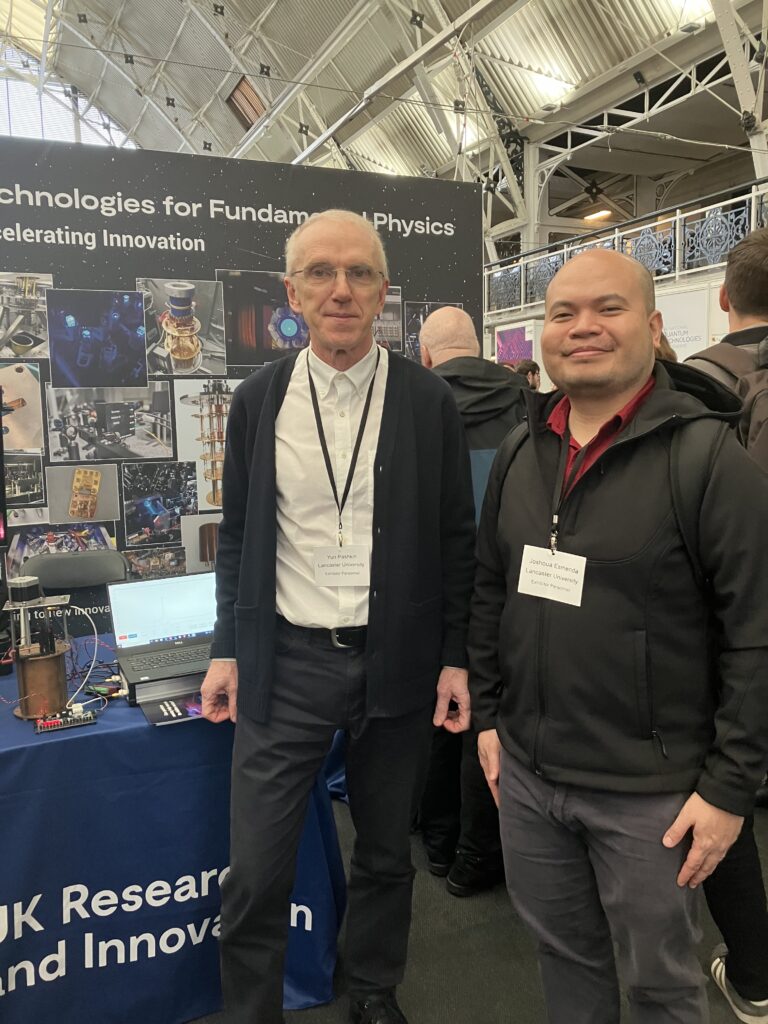
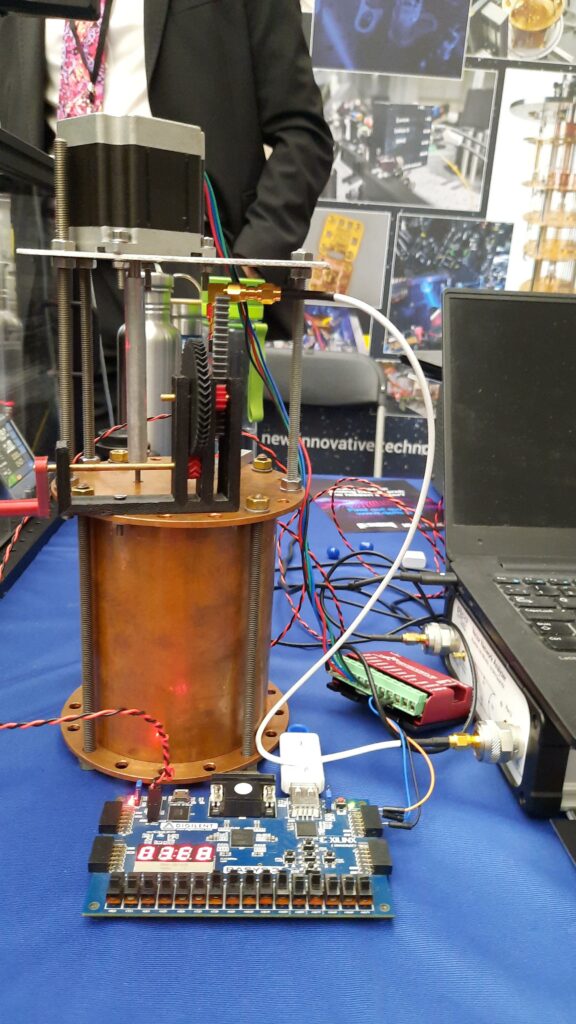
Congratulations to Professor Ed Laird
Congratulations to Professor Ed Laird and the team, University of Lancaster, who have been selected to exhibit at the Royal Society Summer Exhibition, 2-7 July 2024.
The origins and nature of our universe are topics which fascinate young and old. We can all look out at the stars and galaxies in the sky, and yet what we can see is only a fraction of the matter in our universe. Most of the matter in the universe is dark, meaning that it cannot be seen – or even, so far, detected, even though we apparently live within a galaxy-size cloud of it. We know it exists because we can see the effects of its gravity on the evolution of galaxies and of the entire universe, but experiments to date have failed to detect it. This is arguably the greatest challenge of 21st century physics.
Our research uses the very same quantum technologies being developed for quantum computing to build ultra-sensitive dark matter detectors. Quantum computing is a popular topic for the wider public, however our exhibit will show how those same technologies can also deliver answers to some of the most exciting pure research goals, turning a table-top experiment into a big-science observatory.
Our exhibit will use several hands-on demonstrations to provide an intuitive, accessible way to explore these difficult concepts. We are excited to create the exhibits and have plenty of experience making fundamental research accessible to the public through previous Summer Science exhibitions and elsewhere. For secondary school students, these demonstrations will help to explain some of the topics they will encounter in their studies, in some places using GCSE and A-level science topics such as gravity, resonance, and pendulums. We will also produce educational online content with links to further resources that can be used by students and teachers to explore these concepts, including information on how to recreate aspects of the exhibit.”
The Royal Society Summer Science Exhibition is one of the UK’s leading science outreach events and provides a unique opportunity for members of the public to interact with scientists and ask them questions about their work. See https://royalsociety.org/science-events-and-lectures/about-exhibitions/
October 2023
Sir Keith Burnett, Chair of QSHS Oversight Committee, visits Sheffield on Wednesday, 4th October 2023, to see for himself the progress that has been made with the newly refurbished QSHS project laboratory. The laboratory located in the Hicks building, Leavygreave Road, Sheffield, will house the Oxford Instruments dilution fridge and magnet.
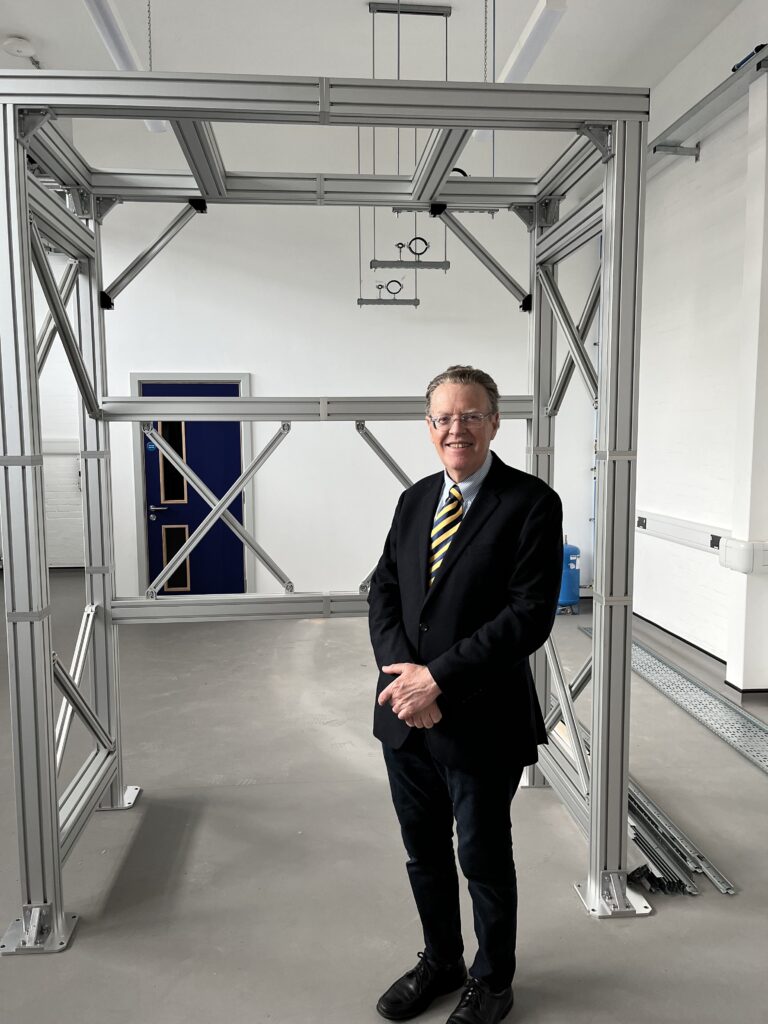
September 2023
Strategic investment in the Faculty of Science, University of Sheffield
The University of Sheffield is seeking to appoint a number of positions from Early Career Research Fellows, through to Senior Lecturers and Chairs in the departments of Physics & Astronomy, Psychology and School of Biosciences. We welcome applications from academics who are leaders, or aspiring leaders, in their chosen fields. For more information on these opportunities, our University and the city of Sheffield, please visit: Faculty of Science – new positions | Science | The University of Sheffield
Job opportunity to work at the University of Sheffield on Dark Matter searches. See message from Dan Tovey, Professor of Particle Physics, Department of Physics & Astronomy, below:
The University of Sheffield has just listed a job opening for an Early Career Research Fellow on Dark Matter searches, that will lead to a permanent academic position at Sheffield on successful completion. This is a fantastic opportunity for an ambitious ECR to focus on DM research without formal teaching commitments for five years and then transfer by default to a permanent position. The ECR position is focused on work contributing primarily to our existing DM programme, namely LZ, XLZD, ADMX and QSHS, possibly together with another experiment from our current portfolio.
For further details:
https://cern.ch/fc98r
Closing date for applications is 3 November 2023.
Please contact Dan Tovey (d.r.tovey@sheffield.ac.uk), Vitaly Kudryavtsev (v.kudryavtsev@sheffield.ac.uk) or Sheffield PPPA group leader Davide Costanzo (d.costanzo@sheffield.ac.uk) if you have any questions.
SubirFest 2023 – 11-13 September 2023, 2 day meeting, to honour Emeritus Professor Subir Sarkar. https://subirfrest.web.ox.ac.uk
August 2023
QSHS Collaboration meeting held at Oxford University, 23rd August 2023, included project updates, discussion of next steps, with an opportunity for networking and lab tours by Peter Leek and Boon Kok Tan.
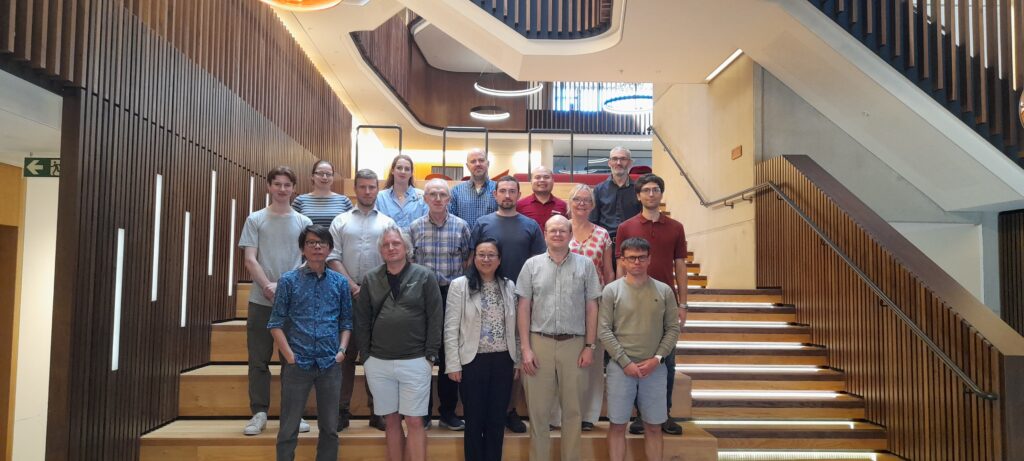
It was good to know that the lab refurbishment at Sheffield is complete and ready to house the Oxford Instruments Dilution Fridge and Magnet, which is expected to be delivered in early 2024.
We heard talks from several QSHS members covering:
- Developments of SLUG microwave amplifiers (talk by Ling Hao, NPL)
- Electromagnetic couplings of Axions (talk by Anton Sokolov, University of Liverpool)
- Results of characterisation of the 3D Aluminium Cavity (talk by Josh Esmenda, University of Lancaster)
- Microwave photon detection using superconducting circuits progress (talk by Michele Piscitelli, University of Oxford).
- Updates on the Field Shield Design (led by Ed Laird, University of Lancaster).
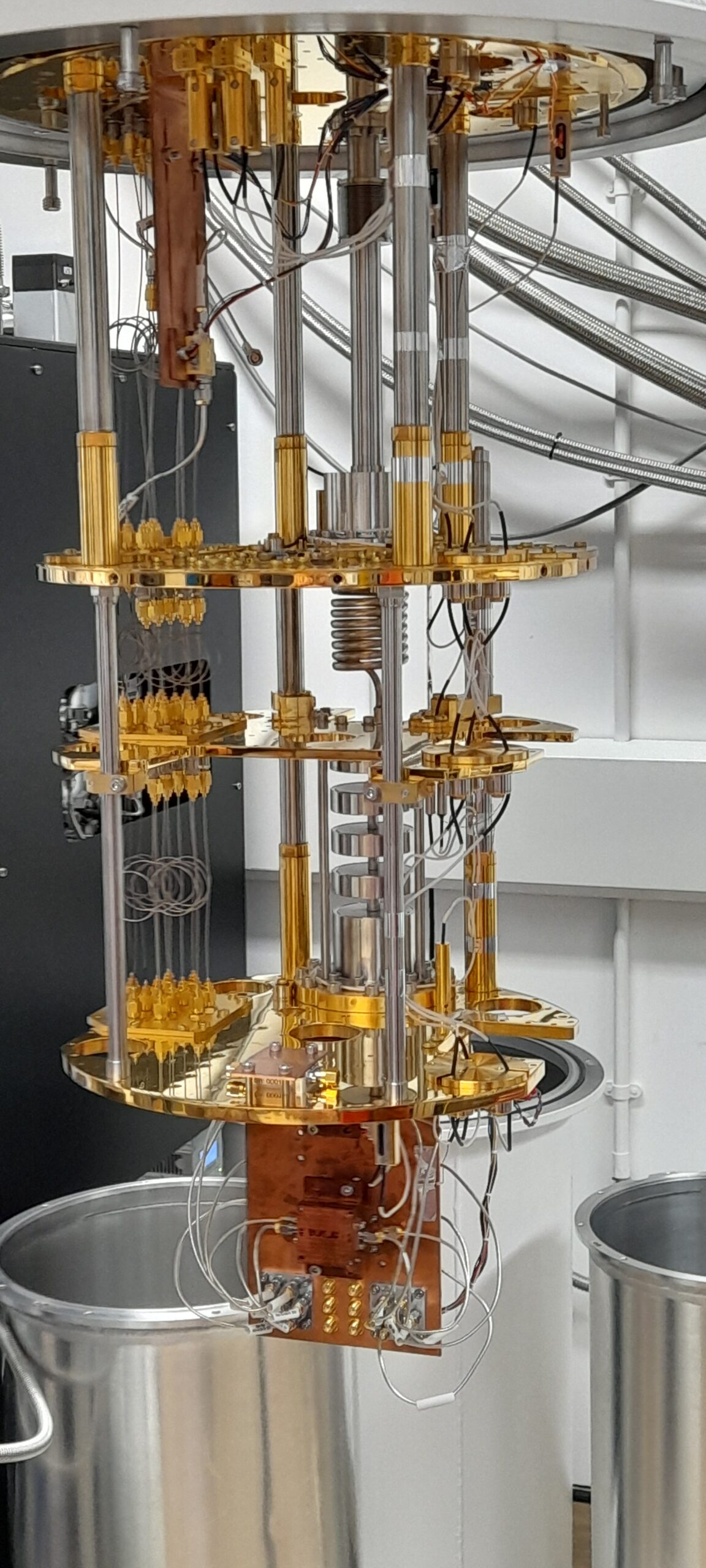
Dilution Fridge at University of Oxford
Recommended reading:
Broadband Squeezed Microwaves and Amplification with a Josephson Traveling-Wave Parametric Amplifier
Towards a Quantum Network with Waveguide Quantum Electrodynamics
July 2023
QSHS Collaborator Subir Sarkar, University of Oxford, writes about the GGI Florence Workshop, Galileo Galiei Institute for Theoretical Physics:
The Galileo Galiei Institute in Florence recently organized a Workshop during 26 April to 9 June 2023 on: Axions across boundaries between Particle Physics, Astrophysics, Cosmology and forefront Detection Technologies. “The purpose of this workshop was to bring together scientists with different backgrounds and expertise to discuss open problems, recent developments and future directions in axion physics, a field that is notoriously replete with interdisciplinary connections. The aim is to foster a fruitful cross breeding between different theoretical areas, with a focus on certain open issues in axion particle physics, astrophysics and cosmology. Quantitative assessments of the axion contribution to Cold Dark Matter (CDM) involve top-notch lattice simulations of non- perturbative QCD effects, as well as of the cosmic evolution of axionic topological defects. Astrophysical observations provide strong bounds on axion properties because stellar evolution would be affected by the existence of axions and, intriguingly, some excesses in star energy losses have been reported. Cosmological scenarios in which the Peccei-Quinn symmetry is broken before inflation foresee axions imprints in the CMB, while in post-inflationary scenarios axion miniclusters, with overdensities several orders of magnitude larger than the local density of CDM, are expected to form, and a reliable assessment of their properties is of utmost importance. From the experimental side, a blossoming of potentially game-changing ideas, with an exciting crossover from experimental particle physics to materials science and cutting-edge technologies is inspiring new methods for axion searches. Novel techniques have been put forth that, besides exploiting the axion- photon coupling, aim to reveal axions via their couplings to nucleons and electrons. The interaction between the experimental and theoretical communities will foster the merging of `how to search’ with `where to search’ into optimized strategies to hunt for the axion.”
* Training week (1st week: April 26-28)
* Axion astrophysics (2nd & 3rd weeks: May 2-12)
* Axion cosmology (3rd & 4th weeks: May 8-19)
* Axions in particle physics (4th & 5th weeks: May 15-26)
* Axion experiments (5th & 6th weeks: May 22-June 1)
* Conference week (7th week: June 5-9)
There were many interesting talks by both theorists and experimentalists and vigorous discussions. From the QSHS collaboration, Ed Hardy attended Wks 2 & 3 and gave a seminar on Axion contribution from topological strings, while Subir Sarkar attended Wk 7 and gave a talk on The cosmological axion domain wall problem.
Sheffield Lead Investigator, Ed Daw, welcomed a Summer Work Experience placement to join the team for a few days to get a taste of what it is like to be a researcher in the Department of Physics & Astronomy at the University of Sheffield. Angela Warren, Project Manager, devised a programme of tasks, and together with the help of colleagues Paul Smith, Mitch Perry, and Claude Mostyn, we were able to provide them with a glimpse of our research. At the end of their week the feedback was positive: “they had had a wonderful week and thoroughly enjoyed the experience. What a fantastic opportunity for them to explore the laboratories and see the work which is being undertaken. They very much enjoyed spending their time with staff members. Conversations with their family during the evenings were so interesting and hearing the enthusiasm about what they had been doing and learning was amazing” were some of the comments.
Note: this work placement was organised through the usual official school application process.
June 2023
QSHS PhD Student Claude Mostyn returns from Seattle. Below is a summary of how they spent their time working with our US collaborator ADMX:
“I spent 80 days working with the Axion Dark Matter eXperiment (ADMX) at the Centre of Experimental Nuclear Physics and Astrophysics (CENPA) at the University of Washington, Seattle.
I largely worked on a thermal report of the radio frequency (RF) cabling in the ADMX insert, helping to decrease their heat loads as much as possible whilst maintaining low enough attenuations, and noise temperatures to maintain the signal to noise ratio, whilst pushing for lower temperatures in future runs. I then presented the results of these tests/calculations and the new RF cabling set-up made alongside Gray Rybka to the wider collaboration in a weekly meeting – I got some good feedback and enjoyed hearing the inputs and questions from the wider team based on their areas of expertise. I developed a spreadsheet to estimate conductive cable heat loads to allow future cabling changes to be quickly compared.
I also helped out with some of the day-to-day jobs at ADMX, including leak testing and cleaning valves in the dilution fridge; along with cable and component testing (including talking with companies when finding faulty cables), and measuring room-temperature, noise temperatures and gains. Getting to use the laithes, mills and various metal cutters and saws in the student machine shop was also absolutely great.
The highlight was getting to work with the group at ADMX, from fellow grad students and professors to undergrads; everybody was welcoming, friendly, and enthusiastic about the work, and it was a wonderful team. Visitors to ADMX were also very interesting to talk to and meet, including some from the Taiwanese and Korean axion experiments.
Seattle outside of CENPA was also very enjoyable; I hiked (not all the way up) Mt Rainier, and drove with some other CENPA grad students out to East Washington to see the Ancient Lakes; I also got to see some small theatre shows, with “Lydia and the Troll” at the Seattle Rep being a stand out.
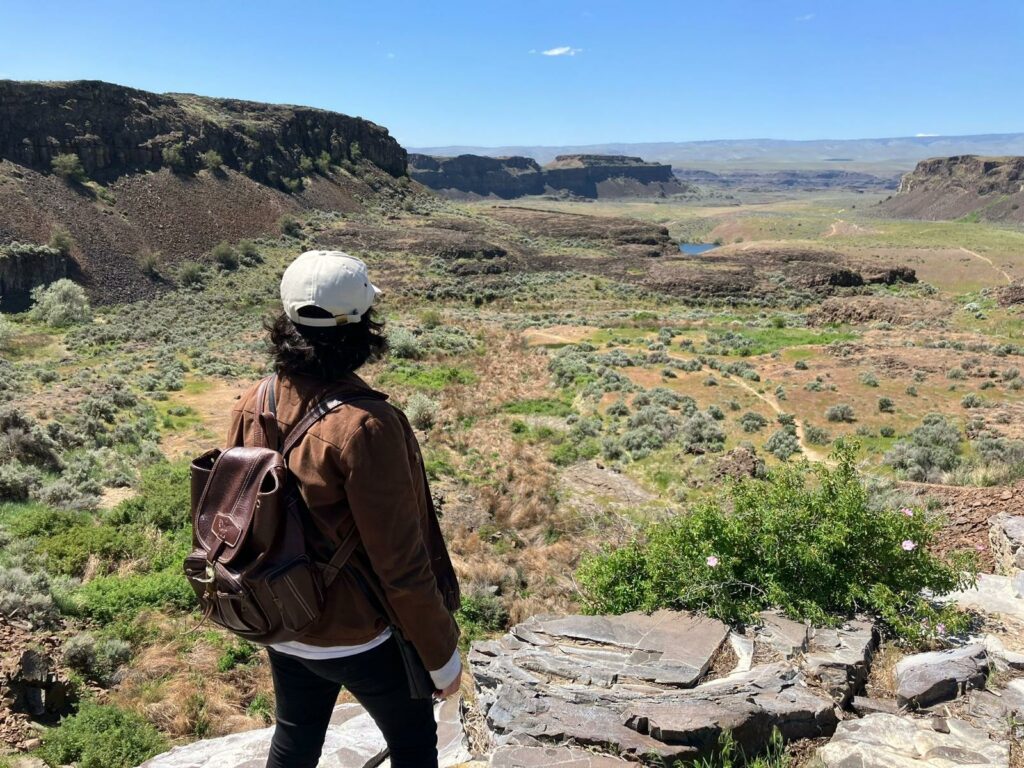
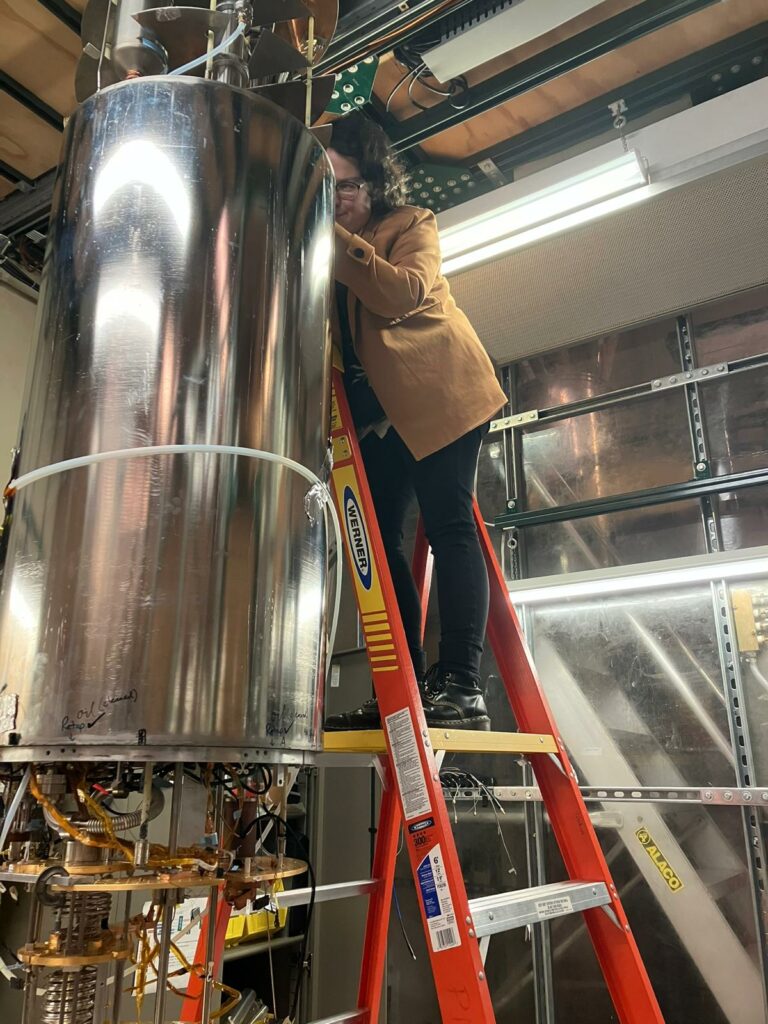
Overall, it was a great experience and I am extremely grateful to the team at ADMX, and Gray Rybka in particular for having me, and I am sure we’ll meet again.”
May 2023
QSHS Project Lead Investigator, Professor Ed Daw, will give a talk titled: ‘The Coldest Place in Yorkshire’ at this year’s Pint of Science event on 23 May 2023. Register. For more information about this event and other Pint of Science festival events refer to the following website: https://pintofscience.co.uk/
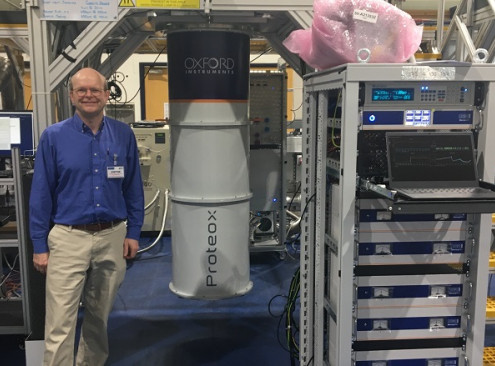
Recently published QUAX papers relevant to our work
A haloscope amplification chain based on a traveling wave parametric amplifier
A tunable clamshell cavity for wavelike dark matter searches
April 2023
Joint IOP APP and HEPP conference
Paul Smith and Ling Hao attend IOP Joint APP and HEPP conference (conference website: https://iop.eventsair.com/hepp2023/), Kings College London, held 3rd-5th April 2023. Paul gave an overview of the QSHS project and Ling Hao submitted a poster titled: Developing Pilot Tuneable Microwave Receiver for Axion Detection (see below).
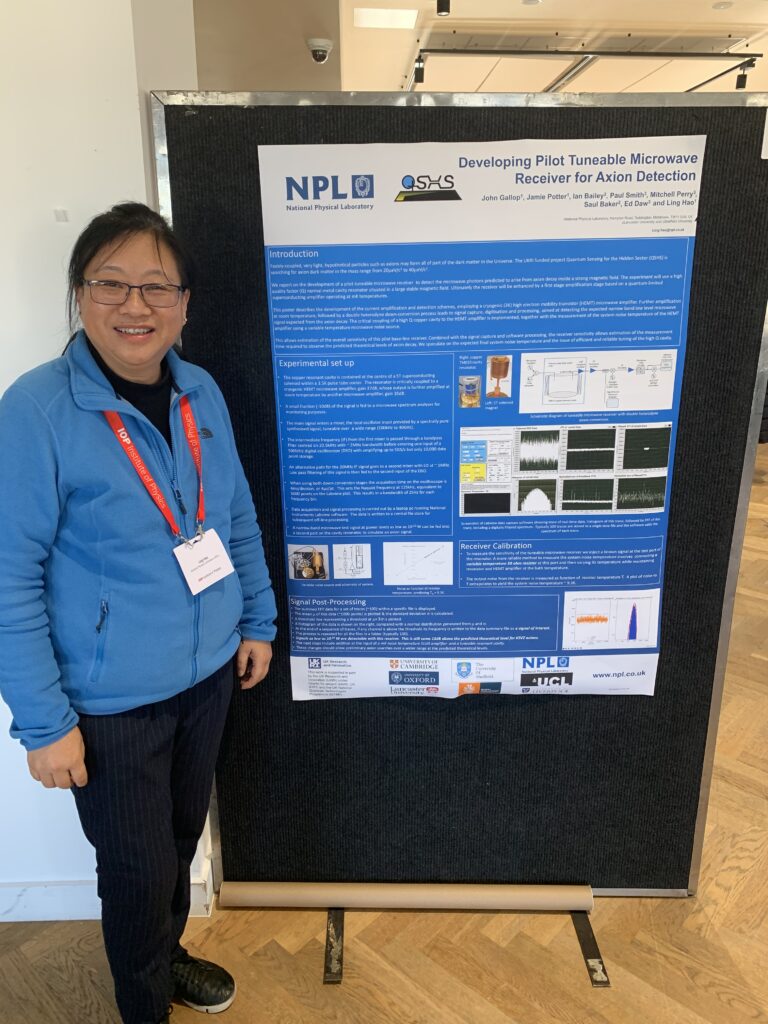
Secretary of State for Science visits National Physical Laboratory
The Rt Hon Michelle Donelan, Secretary of State for Science, Innovation and Technology visits the National Physical Laboratory’s (NPL) Advanced Quantum Metrology Laboratories – read more here.
Joshoua Esmenda joins the team at Lancaster
We say a warm welcome to our new QSHS member, Joshoua Esmenda, PDRA, who joins the team at Lancaster University. Joshoua brings relevant experience in nanofabrication, low temperature cryogenics, and superconducting devices.
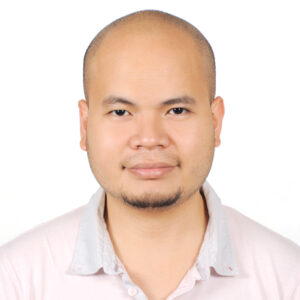
March 2023
STFC Town Meeting
STFC will be holding a town meeting as part of the 2023 IOP Joint APP and HEPP Annual Conference, taking place 3rd – 5th April at King’s College London. The town meeting is scheduled for Tuesday 4th April, 15:00 – 17:30, and will include a report from the Executive Chair, Mark Thomson, and the opportunity to hear updates from the Chairs of STFC’s Science Board, Particle Astrophysics Advisory Panel, and Particle Physics Advisory Panel. The STFC town meeting will now be streamed online and a link to the Zoom meeting will be made available on the IOP website: IOP Joint APP and HEPP Annual Conference (eventsair.com)
National Quantum Strategy is published by UK Government
10 year plan and vision for Quantum in the UK – read more.
February 2023
QSHS collaboration meeting held 13th February 2023, University of Liverpool
We held a collaboration meeting on Monday, 13th February 2023, hosted by Ed Hardy, University of Liverpool, to hear updates from the 8 partner groups and discuss the next steps of the project. We are pleased to be able to report that great progress is being made, leading to some promising results. One very interesting outcome and useful resource is a paper on quantum measurement by Professor Stafford Withington, University of Oxford, see article Quantum Electronics for Fundamental Physics (submitted February 2023): https://arxiv.org/abs/2302.04000
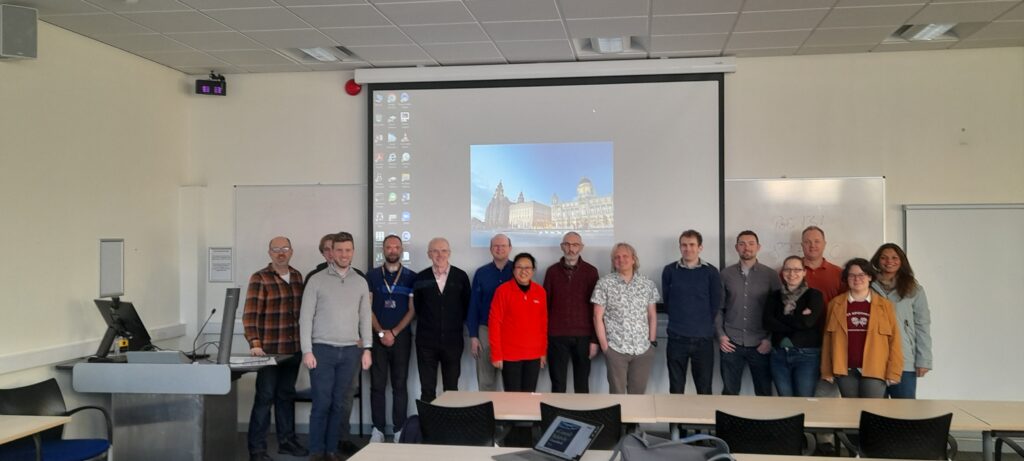
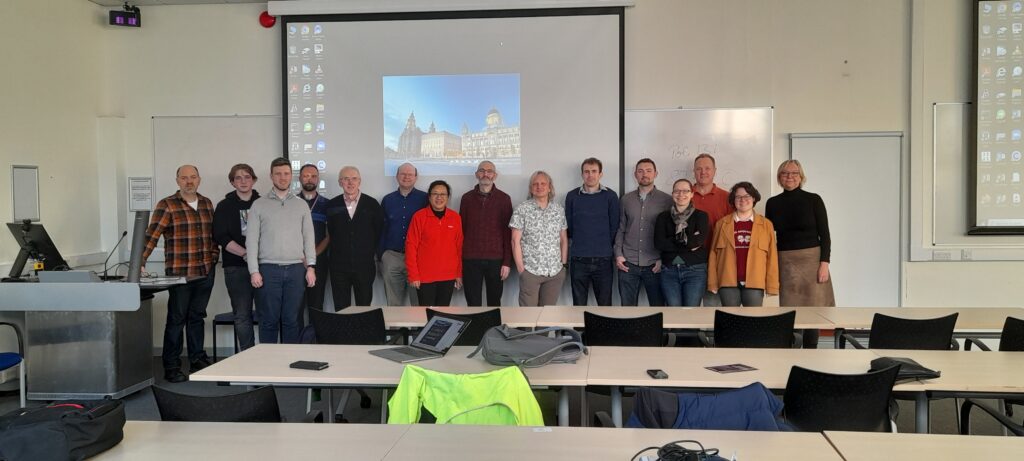
Quantum Technologies for Fundamental Physics Engagement Event held, 2nd & 3rd February 2023, University of Warwick
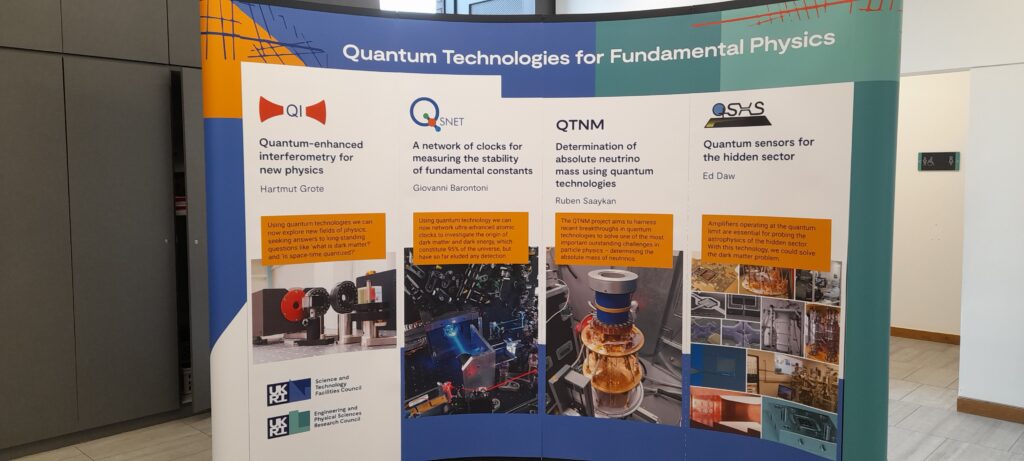
Members of the QSHS consortium attended this two day in person showcase event to hear the progress and potential of the QTFP core programme. The event covered:
- Updates from the ongoing projects (talks and posters)
- Elevator pitches from new members
- Discussions of future ideas
- Breakout sessions
- Update and Q&A from STFC and EPSRC Senior Management
The event was very well attended with over 100 attendees so it was a great opportunity for networking and encouraging further collaborations. We heard some really interesting talks from researchers involved in the programme, with updates on progress from each of the 7 QTFP projects.
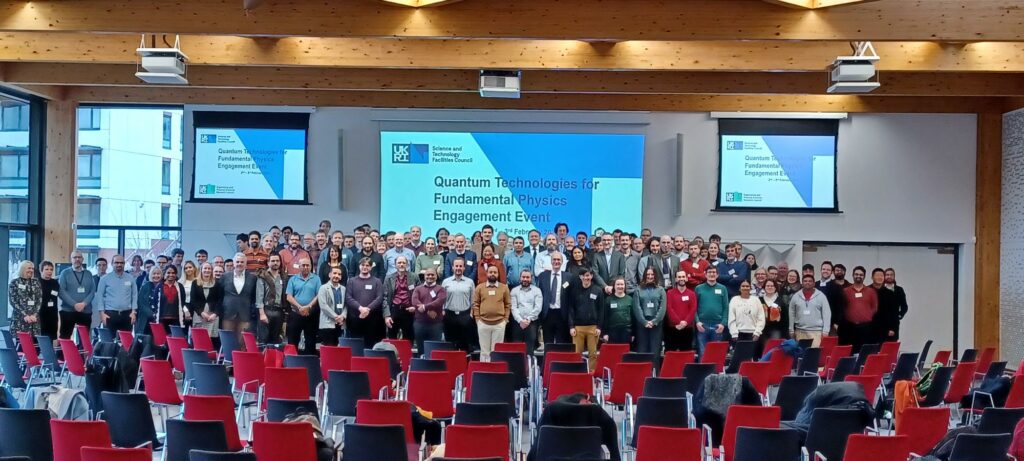
All projects demonstrate there are already excellent cross-institutional links and international collaborations, emerging technologies and developments in new areas in the field, with the potential to create world-leading facilities in the UK. Thanks to the organisers at STFC and Warwick for bringing everyone together, it was an extremely successful and enjoyable conference.
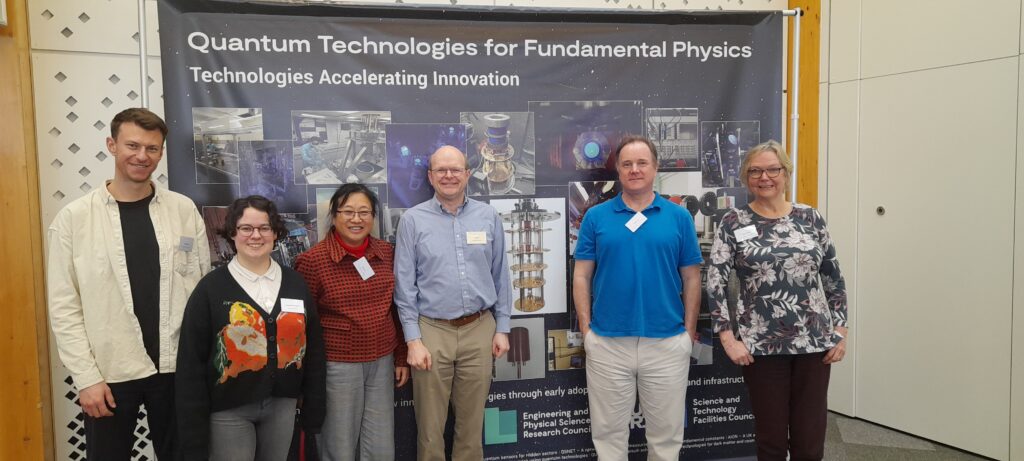
January 2023
Postdoctoral vacancy at Pacific Northwest National Laboratory
The Detection Physics group at Pacific Northwest National Laboratory is looking for a postdoc to work primarily on the Axion Dark Mater eXperiment (ADMX). Applications will be accepted through February 23rd 2023. For more information and to apply, please go to https://careers.pnnl.gov/jobs/6104.
CERN Summer Student Programmes – Application deadline 30th January 2023
Applications are welcomed by B.Sc. or M.Sc. students in computer science, mathematics, engineering or physics. More information about the summer student programme is available at CERN Openlab
Link to apply
QTFP Winter School 2023
Professor Ed Daw, QSHS project lead, consortium members Dr Ian Bailey, Professor Stafford Withington and PhD students Claude Mostyn and Searbhán Ó Peatáin, start the year with the QTFP Winter School 2023, 9th-13th January 2023, University of Cambridge, where they will be tutoring students and postdocs researching within the QTFP programme. A full timetable for the school can be found at https://indico.cern.ch/event/1215570
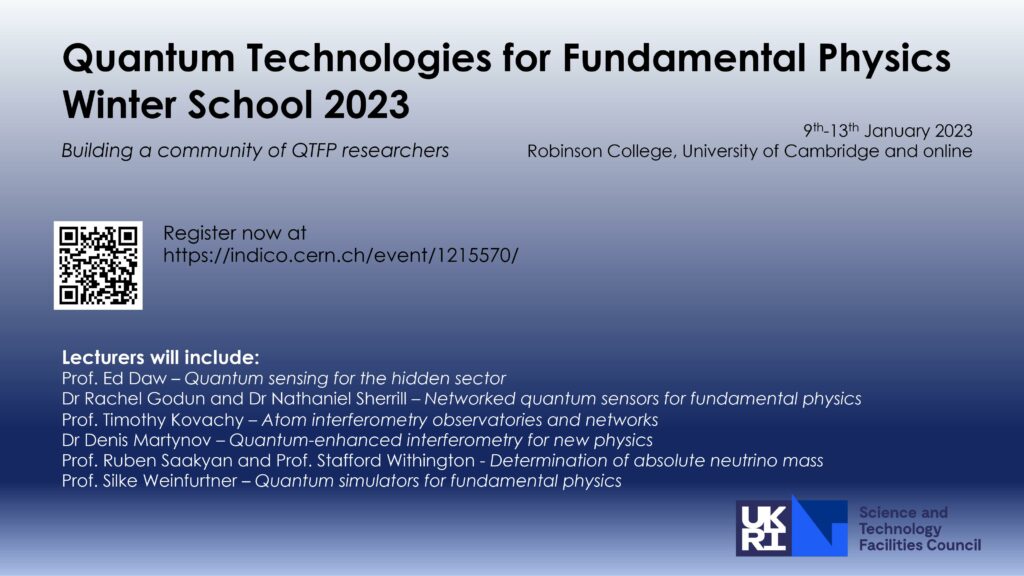
Happy New Year
Happy New Year to QSHS followers and readers. We anticipate an exciting time for the QSHS project with the new lab refurbishment and installation of the QSHS Proteox Dilution Fridge in 2023.
December 2022
We wish our readers all the best for the festive season and a very happy and prosperous 2023; a year that the QSHS project team very much look forward to with the excitement of works starting on the lab refurbishment for the Dilution Fridge Facility planned in Spring. Watch this space for future updates.
If you haven’t seen the latest QSHS publication, you can find it here.
November 2022
Quantum Sensors for the Hidden Sector (QSHS) – A Summary of Our First Year!
| “Quantum Sensors for the Hidden Sector (QSHS) – A Summary of Our First Year!” In 2021 the Quantum Sensors for the Hidden Sector (QSHS) collaboration was founded in the UK. We received funding as part of the Quantum Technologies for Fundamental Physics programme to develop and demonstrate quantum devices with the potential to detect hidden-sector particles such as axions and dark photons in the ~1μeV/c^2 to ~100μeV/c^2 mass window. Our collaboration is formed from a diverse community of condensed matter physicists, quantum technologists, theorists and (astro) particle physics experimentalists. We are designing and fabricating a range of “quantum devices” and constructing a high-field, low-temperature facility at the University of Sheffield to characterise and test the devices in an axion haloscope geometry, initially using an rf cavity. This poster was presented at the 17th Patras workshop on axions, WIMPs and WISPs on the 8th August 2022 in Mainz, Germany.www.cambridge.org |
The Cold, The Dark and The Invisible, 31 October 2022
We were pleased to be able to celebrate Dark Matter Day, not on the usual recognised Dark Matter Day of 31 October but slightly later, on Monday 21st November 2022, where Professor Ed Daw gave an interesting talk to Year 12 students and upwards on The Cold, The Dark and The Invisible. Over 100 attended this Outreach event.
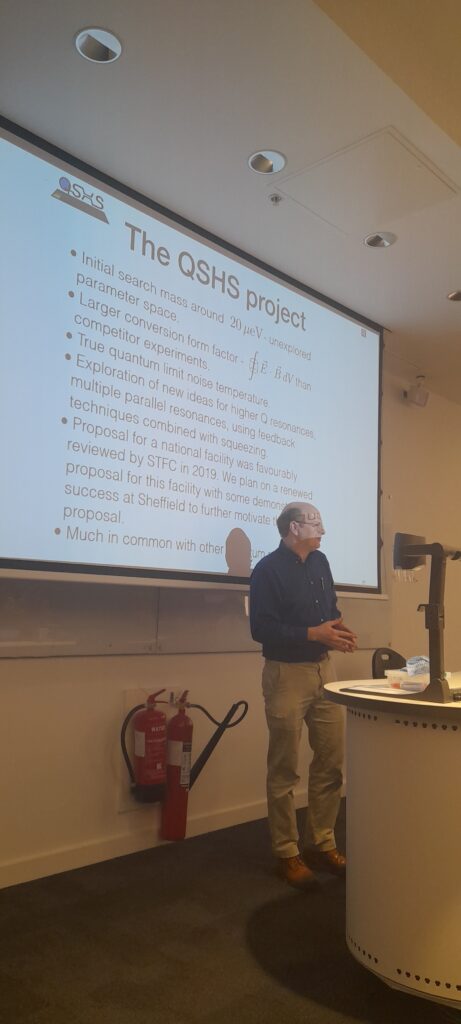
Uk National Quantum Showcase 2022, London
Collaboration members exhibit; Ed Romans, Ling Hao, John Gallop and Bhaswati Chakraborty at UK National Quantum Showcase 2022, attended by over 1000 visitors on 11th November.
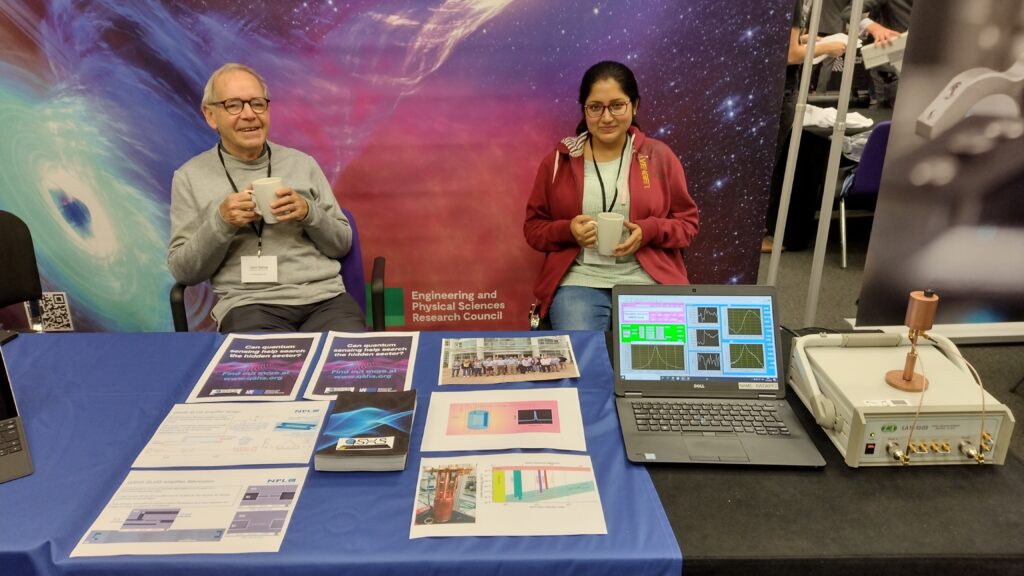
For further details visit the UK National Quantum Technologies Showcase.
QSHS Flyer is available for download
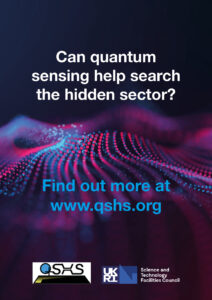
Quantum Technologies for Fundamental Physics Engagement Event – Thursday 2nd and Friday 3rd February 2023
STFC/EPSRC, part of UK Research and Innovation, are hosting a two day in-person event on Thursday 2nd and Friday 3rd February 2023, at Warwick Conferences (https://warwick.ac.uk/services/conferences/location), to promote engagement between scientists and engineers from different types of expertise on quantum technologies and fundamental physics research.
Quantum Technologies for Fundamental Physics (QTFP) is a £40m programme funded through the UKRI Strategic Priorities Fund and part of the National Quantum Technologies Programme (NQTP). The first seven projects were awarded in late 2020, this event will demonstrate the progress that has been achieved so far as well as discuss the future ambitions in this growing space.
The event will be free to attend and open to all communities, but is primarily a scientific event for those across all career stages from the STFC core sciences, EPSRC quantum sciences and technologies and the NQTP.
Registration is via Eventbrite – Quantum Technologies for Fundamental Physics Engagement Event Tickets, Thu 2 Feb 2023 at 10:00 | Eventbrite and closes on the 6th January 2023 If you have any queries please contact qtfp@stfc.ukri.org
Research Directions – Quantum Technologies
Research Directions – Quantum Technologies launching 2023. Cambridge University Press announce new journal. Click here for further information.

UK National Quantum Technologies Showcase 2022
We are pleased to announce that we’ll be exhibiting at the UK National Quantum Technologies Showcase 2022 at the QEII Centre, Broad Sanctuary, Westminster, London, SW1P 3EE, on 11th November.
Be sure to register below so you don’t miss out!
The exhibition will open to delegates/visitors between 9:15am and 4:00pm. We look forward to seeing you there, you will find the QTFP/QSHS project collaborators at Stand no. 1.

American Physical Society News article
An interesting article published in American Physical Society (APS) News, September 2022 (Vol. 31, No. 8) on ‘building a skilled workforce – education in quantum mechanics’. Read the article here.
October 2022
QSHS project is recruiting!
We have a vacancy for a Postdoctoral Research Associate/Senior Research Associate in Superconducting Quantum Devices for Dark Matter Experiments at our project partner institution, Lancaster University. The post is full time, fixed term for 2 years, with an immediate start date. For further details and an application form visit Job Vacancies, Lancaster University. Informal enquiries can be made to Professor Yuri Pashkin (email: y.pashkin@lancaster.ac.uk). Closing date: 20th November 2022.
QSHS members site visit to Oxford Instruments
QSHS members visit Oxford Instruments and met with the technical team members who will build the Proteox Dilution Fridge and Magnet. Work is scheduled to start October 2022.
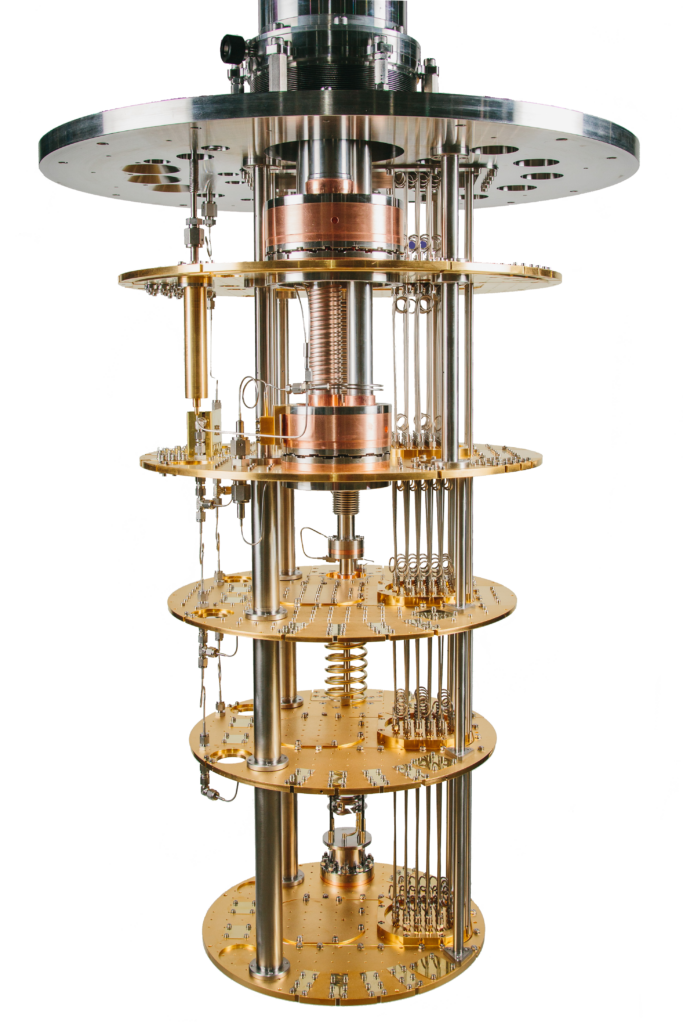
September 2022
Quantum Systems Theory Workshop
The QSHS collaboration organised a Quantum Systems Theory workshop at IPPP, Durham, 6th-8th September 2022. This was an invitation only meeting attended by members of the Collaboration, with talks on Quantum Systems Theory. The meeting ended with planning and discussion of our activities over the next 12 months. We are grateful to IPPP for their contribution and help in organising this event, and to our special guests for their input.
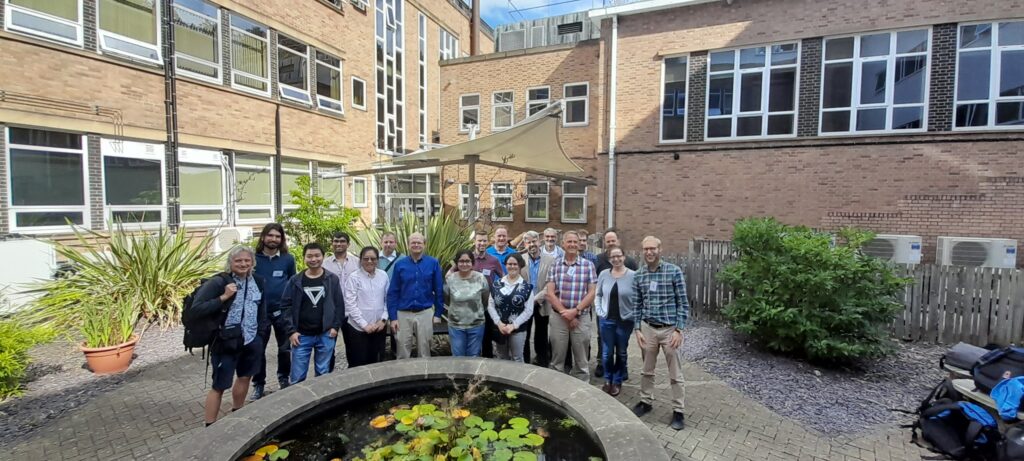
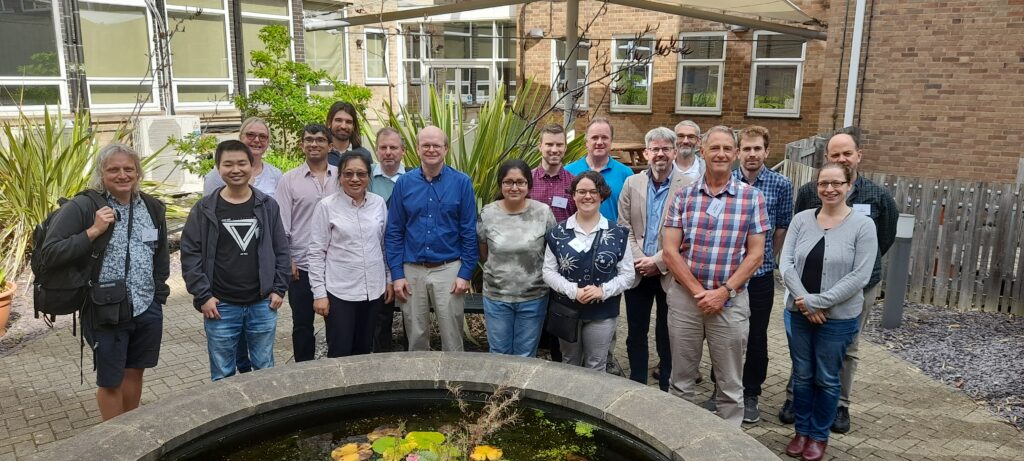
A special thank you to our guest speakers (John Gough (University of Aberystwyth), Saptarshi Chaudhuri (Princeton University), Pieter Kok (University of Sheffield), Stafford Withington (University of Oxford).
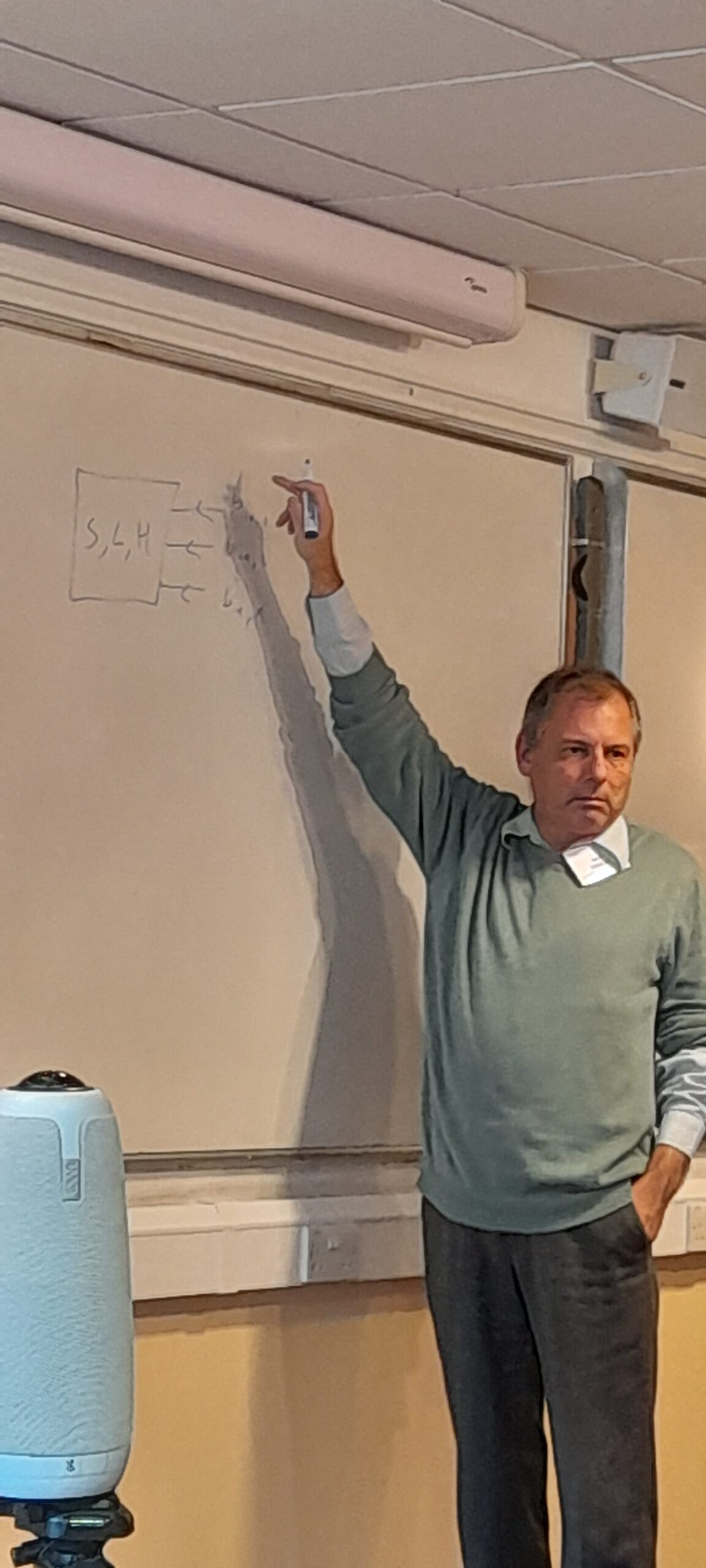
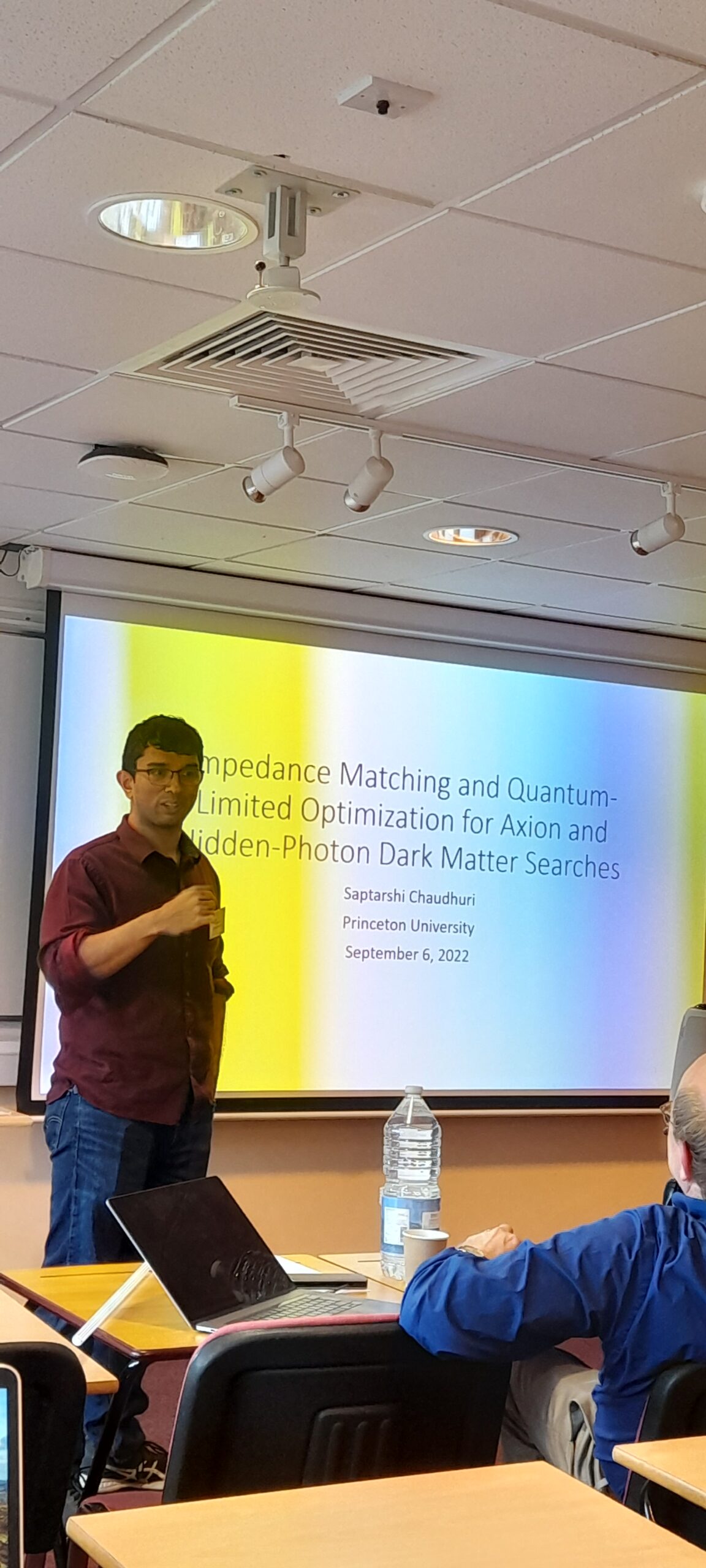
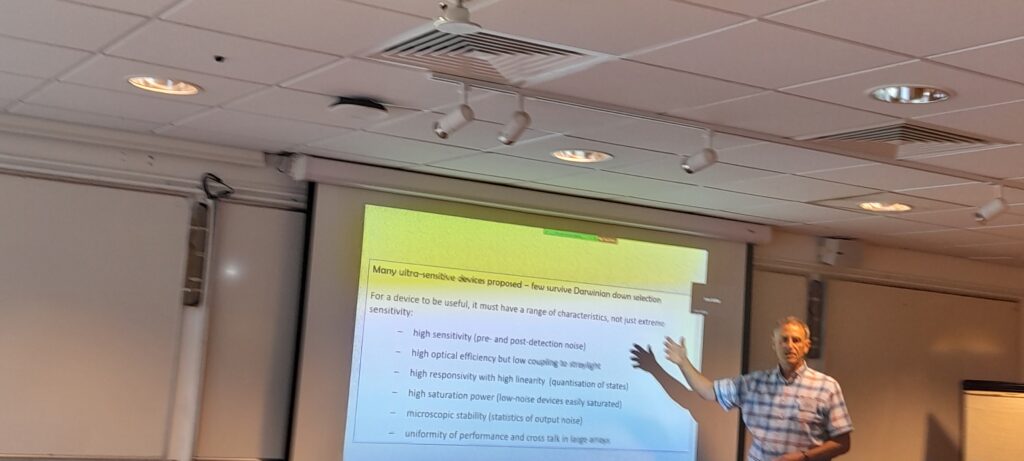
Cosmology and Astrophysics Meeting, Durham, 8th September 2022
During the same week there was a Cosmology and Astrophysics meeting, organised by Organising Committee (Martin Bauer, Fran Chadha-Day, Jamie McDonald) where a QSHS talk, titled ‘Overview talk on QSHS – A UK search for hidden sector dark matter’ was presented by Ed Daw.
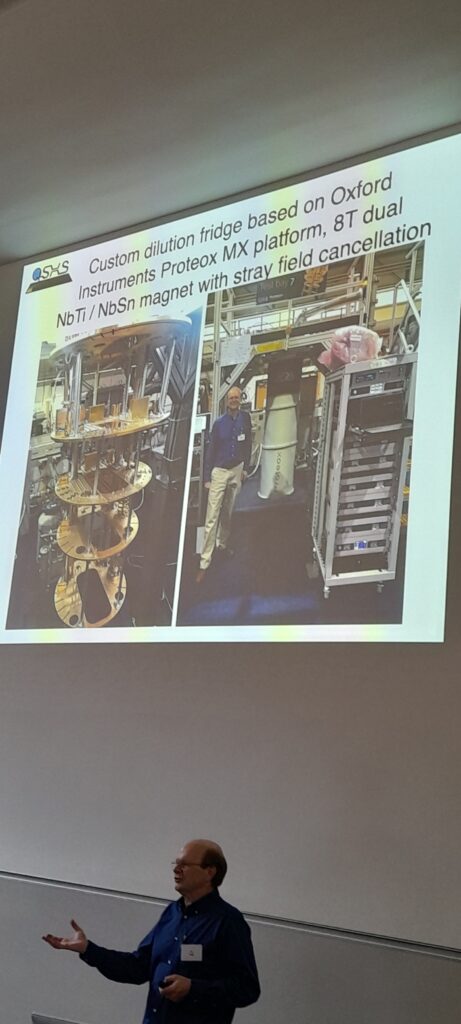
Particle Astrophysics Roadmap
The Particle Astrophysics Advisory Panel is pleased to announce that the 2022 Particle Astrophysics Roadmap is now available on the STFC website: https://www.ukri.org/publications/particle-astrophysics-advisory-board-roadmap-2022/
August 2022
QTFP funding
£500,000 is awarded for developing dark matter detection with a project titled “ParaPara: A Quantum parametric amplifier using quantum paraelectricity”, led by Ed Laird, Yuri Pashkin and Ian Bailey, Lancaster University in collaboration with University College London. Funded as part of the Quantum Technologies for Fundamental Physics Programme.
Read more: Physicists developing a dark matter detector.
Oxford Instruments
We are delighted to announce that the QSHS dilution refrigerator and magnet are being built by Oxford Instruments.
Oxford Instruments made the announcement on 4th August 2022. Read here.
We look forward to working closely with Oxford Instruments over the next few months. Watch this space for further updates.
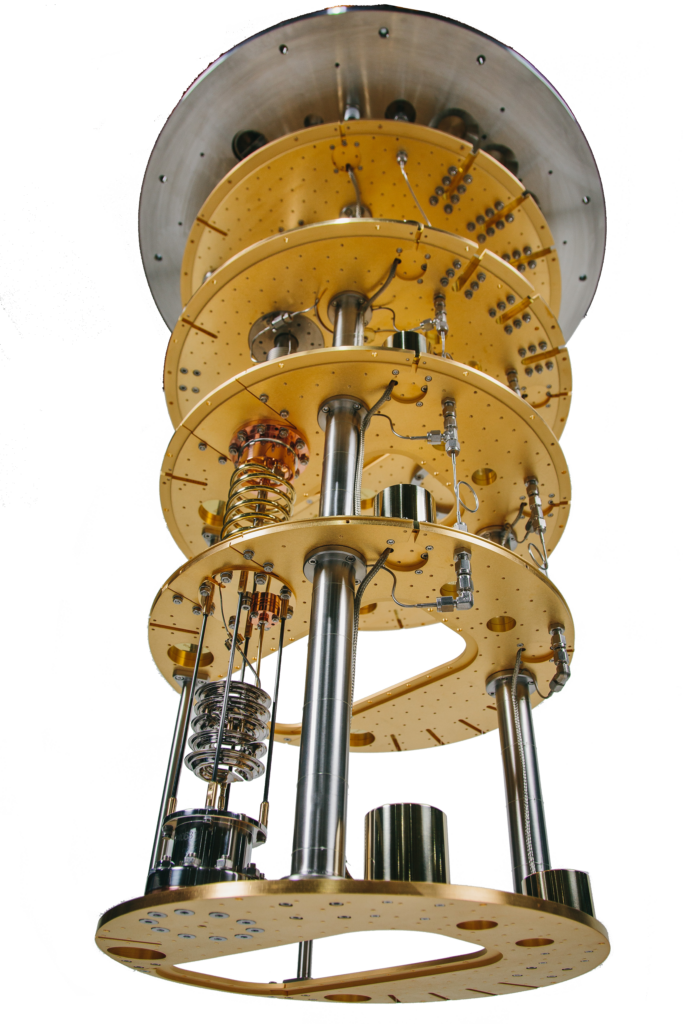
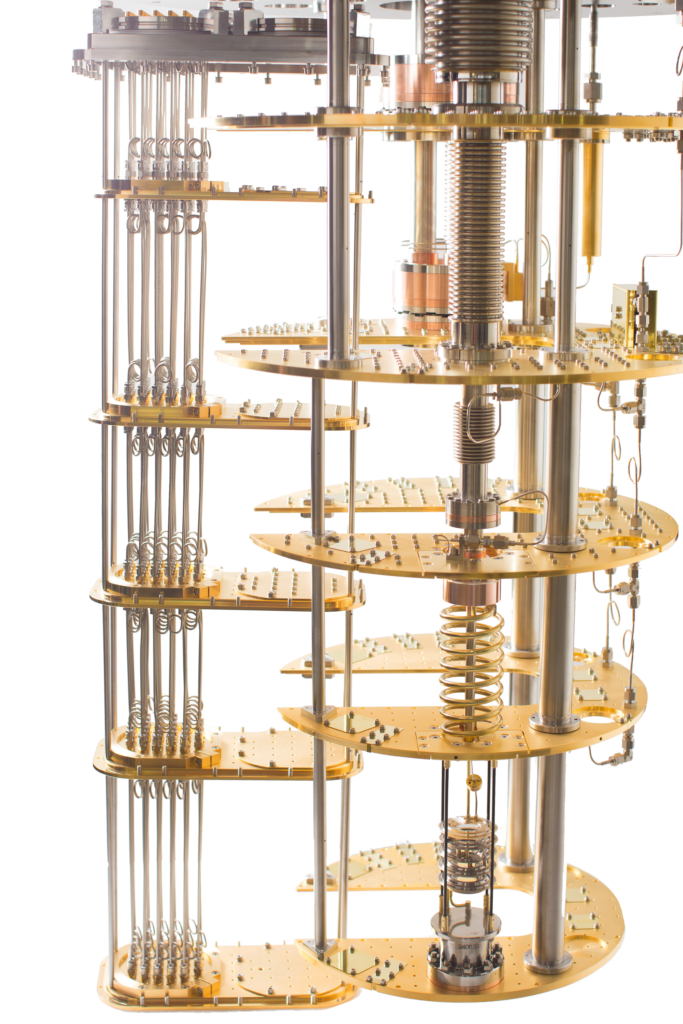
LT29 Best Poster Award
We are pleased to announce that Searbhán Ó Peatáin, University of Lancaster, PhD student with QSHS, received the LT29 Best Poster Award at the International Conference on Low Temperature Physics for the poster P20-SF4-17: Comparison of Simulation and Experimental Results of Travelling Wave JPAs in the Three Wave Mixing Regime. Many congratulations to Searbhán.
July 2022
James Webb space images revealed
James Webb space telescope images are truly amazing! See the images for yourself in Webb News – they are simply stunning.
June 2022
QSHS Collaboration meeting, NPL, 27th June 2022
The QSHS project groups met for a Collaboration meeting, hosted by the National Physical Laboratory (NPL), on 27th June 2022. It was a great opportunity to hear talks from the young researchers working on the QSHS project and updates on the excellent progress being made. The meeting ended with a tour of NPL. Our thanks to all involved, especially to Ling Hao, Gemma Chapman, Jamie Potter and John Gallop for hosting the event.
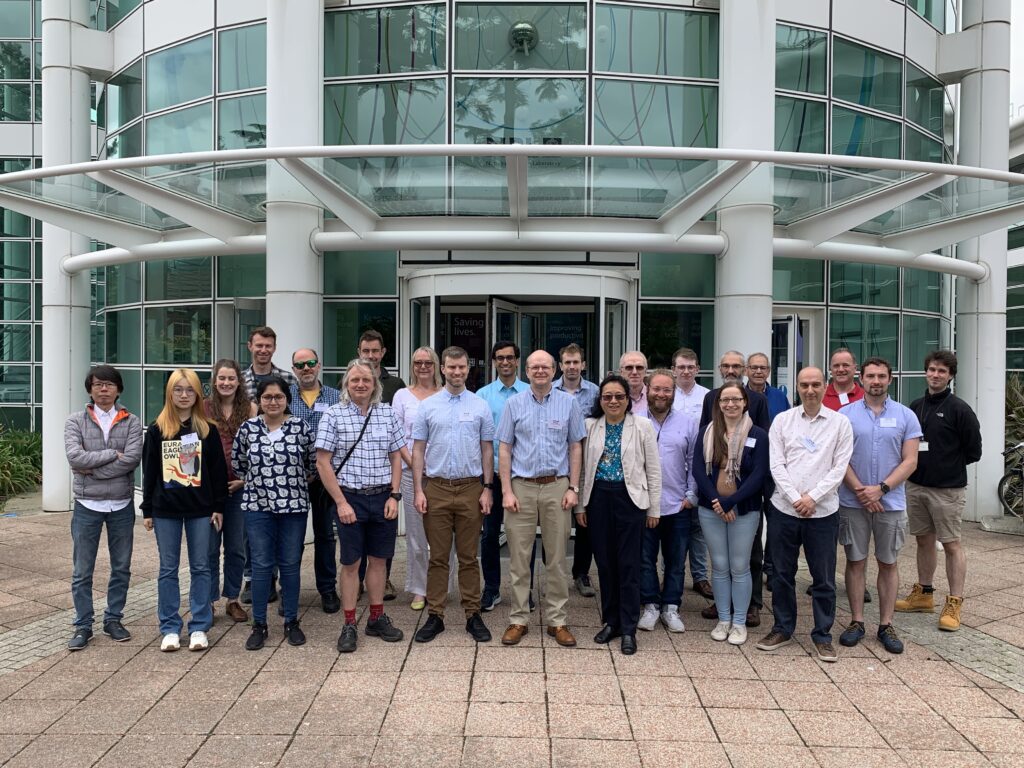
A tour of the NPL was fascinating, and what an amazing place to work in for delivering these large-scale research projects.
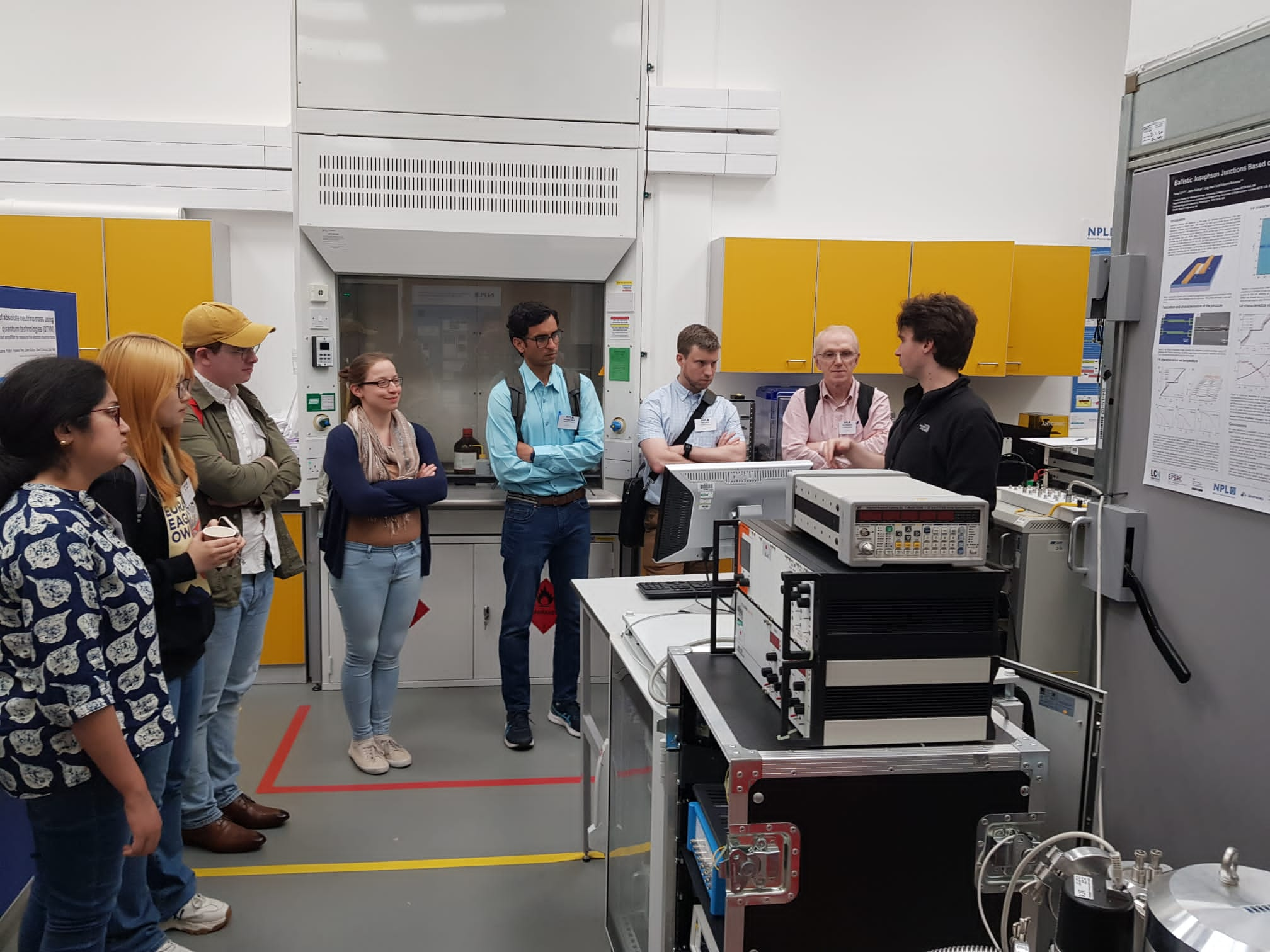
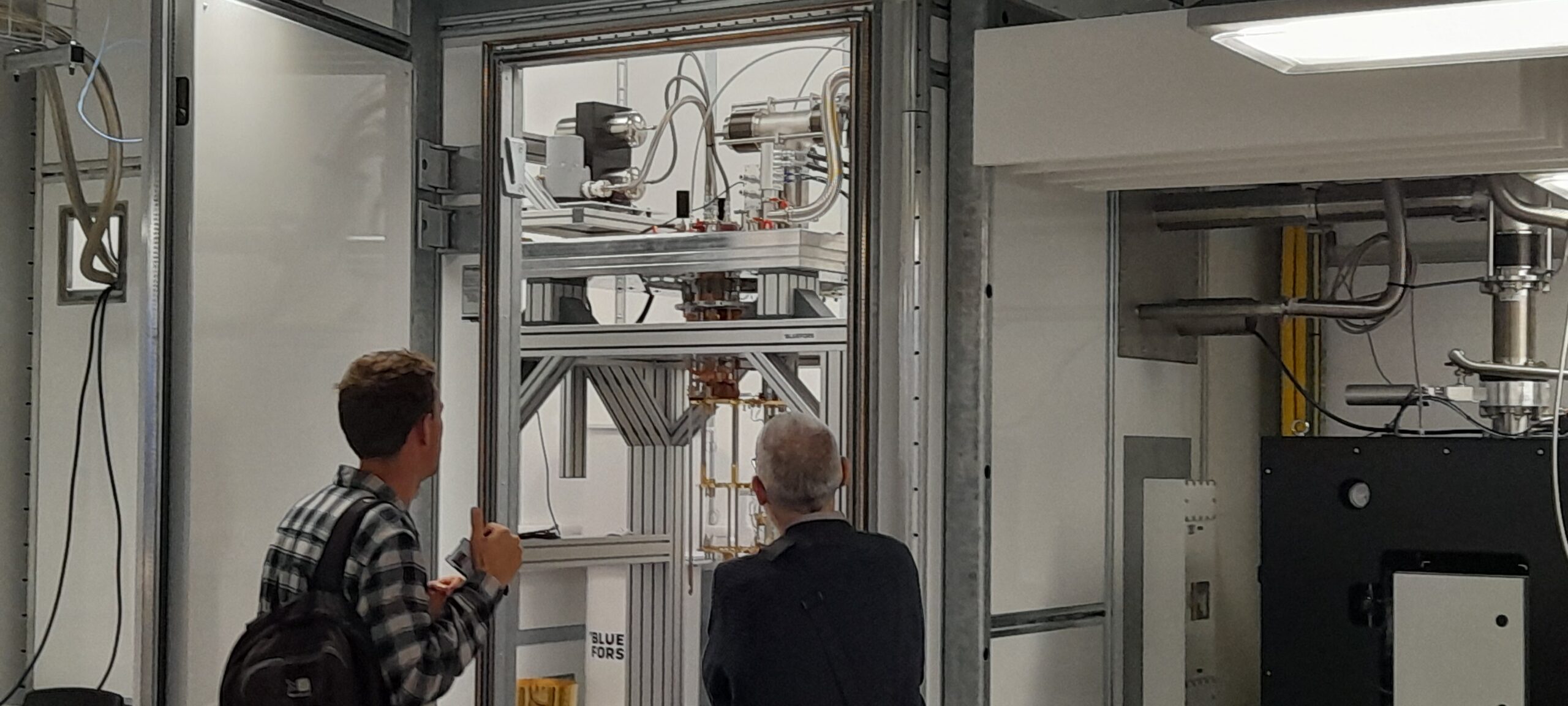
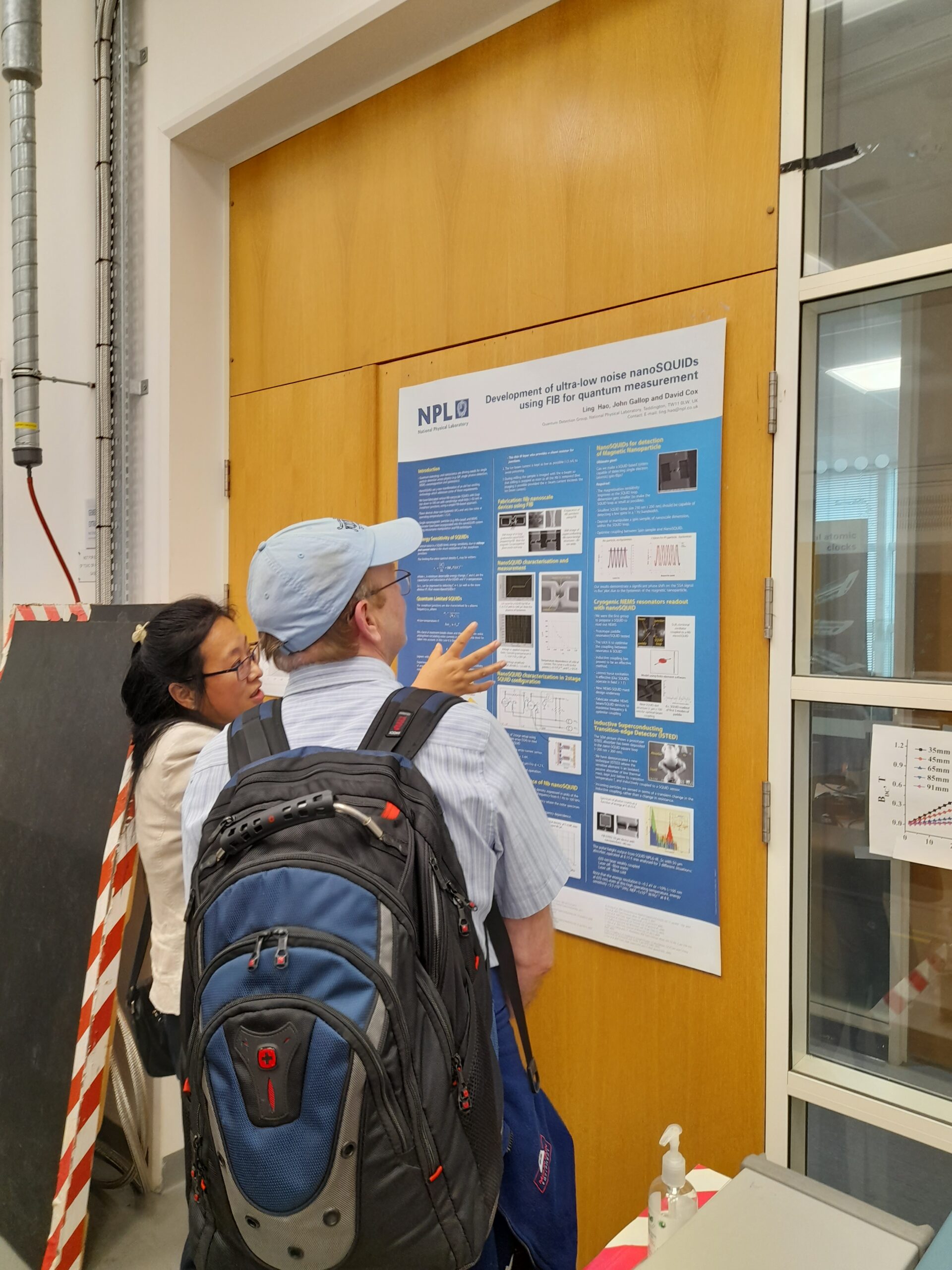
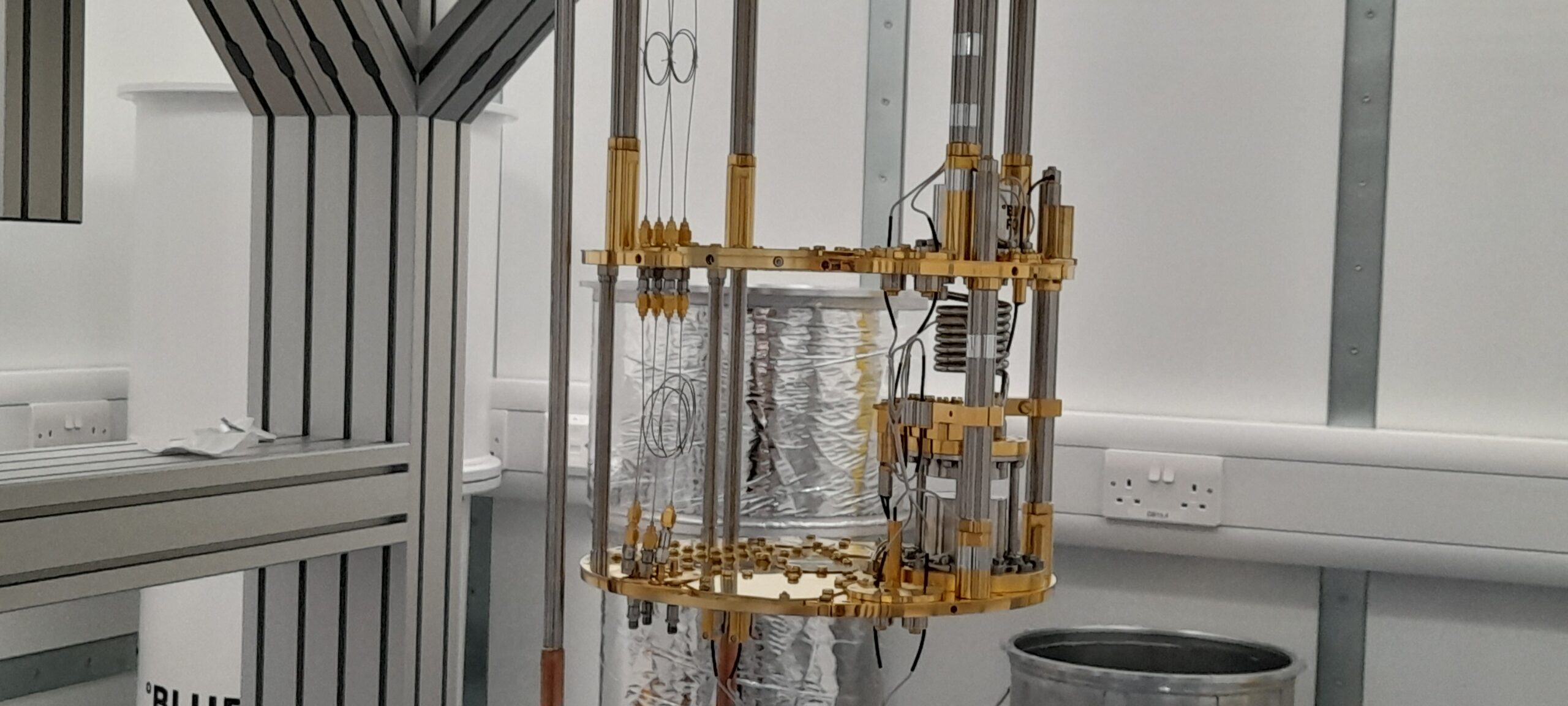
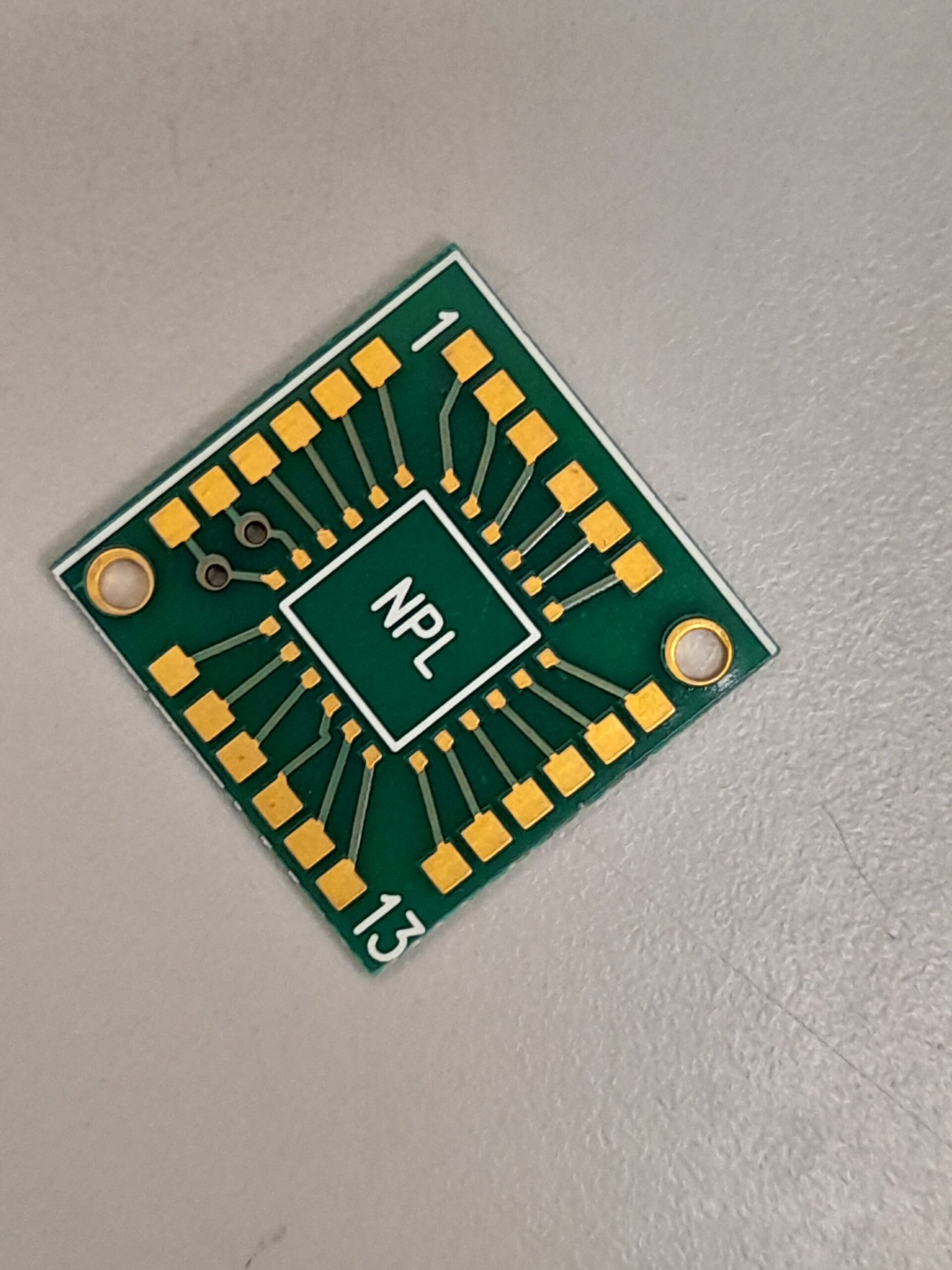
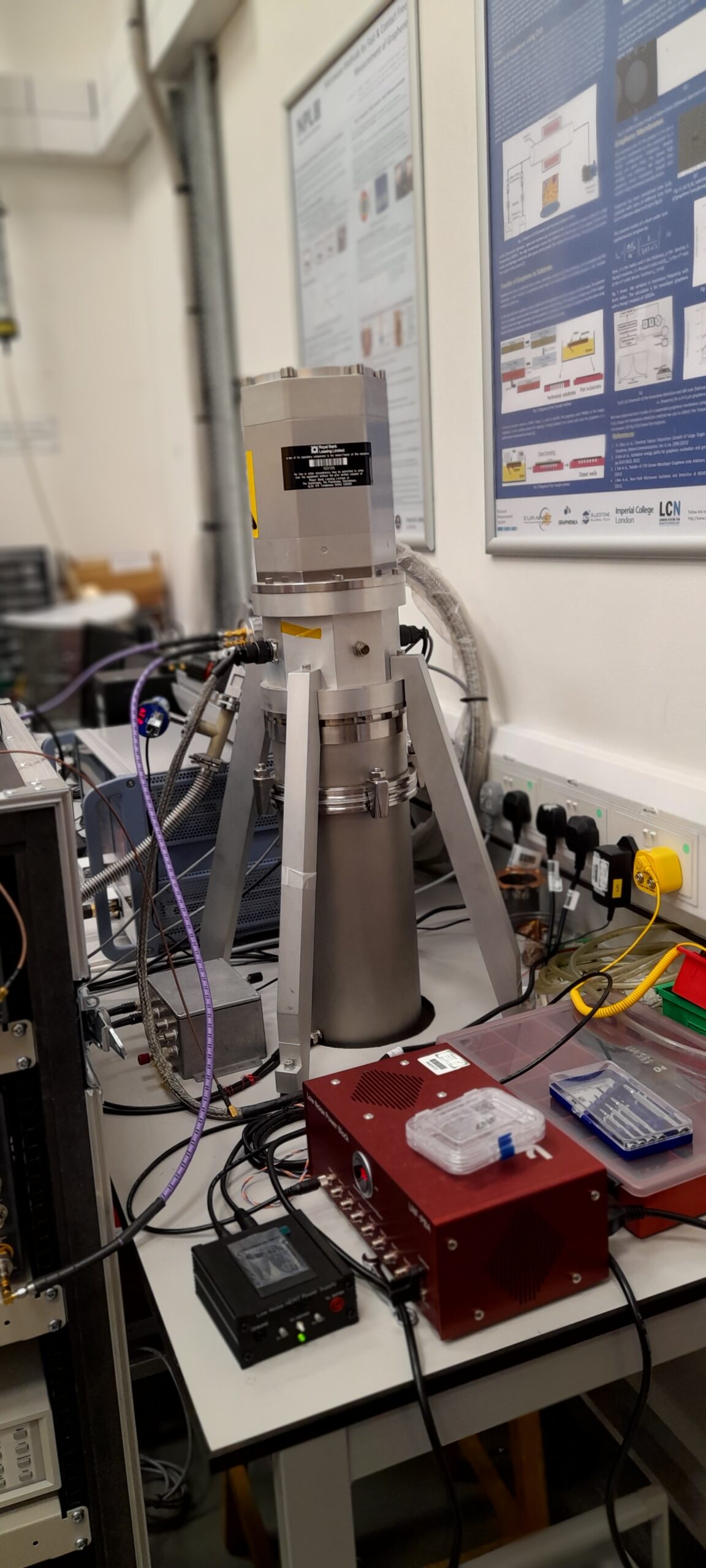
Our meeting finished with some time for networking and more discussion on the QSHS project (below).
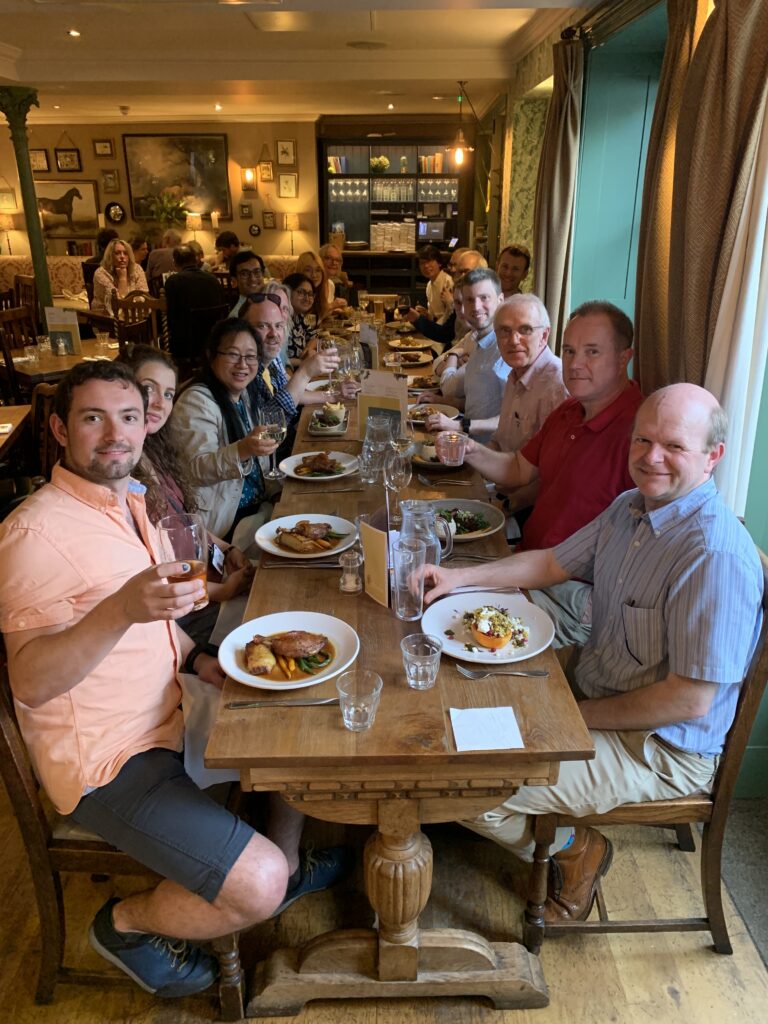
Pint of Science 2022
If you missed the Pint of Science event in Lancaster last month, you can catch a demonstration by Ed Laird, QSHS project investigator, of how we infer the existence of dark matter (see below). If all you can see is the balloon, you still know something must be pulling on the string. All we can see is orbiting stars, but we can still infer that dark matter must be pulling on them. Interesting hey?
May 2022
Outreach event: Particles, Polymers and Periodicity
Dr Edward Laird, discusses searching for dark matter using quantum technology at the Outreach event: Pint of Science, 10th May 2022. The event was attended by over 40 people and received excellent feedback. Pint of Science.
Introducing the QSHS project students:
Searbhán Ó Peatáin, PhD Student, working with Prof. Yuri Pashkin, University of Lancaster.
Mitch Perry, PhD student, working with Prof. Ed Daw, University of Sheffield.
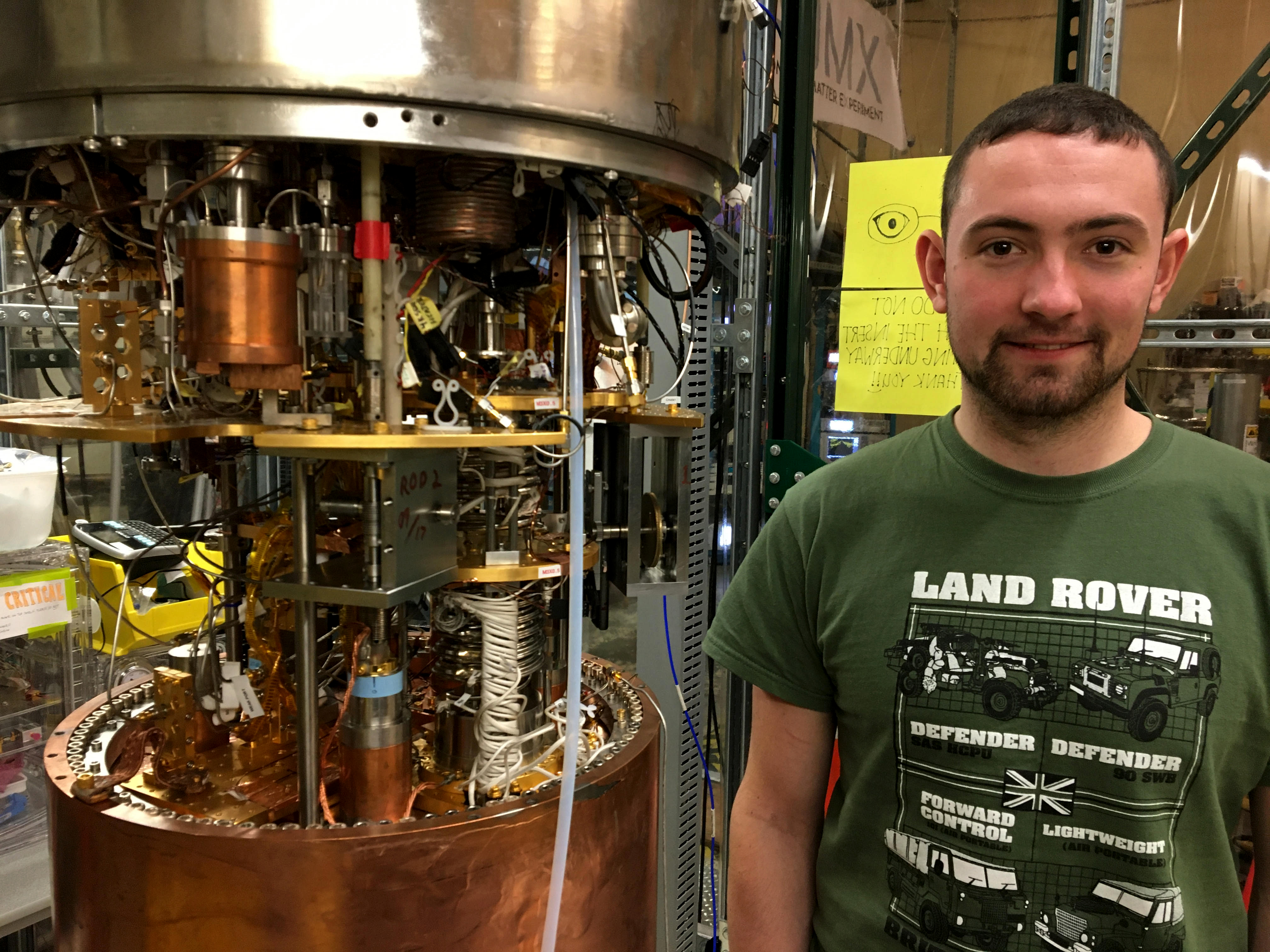
Claude Mostyn, PhD Student (STFC funded) joined the QSHS in September 2022.
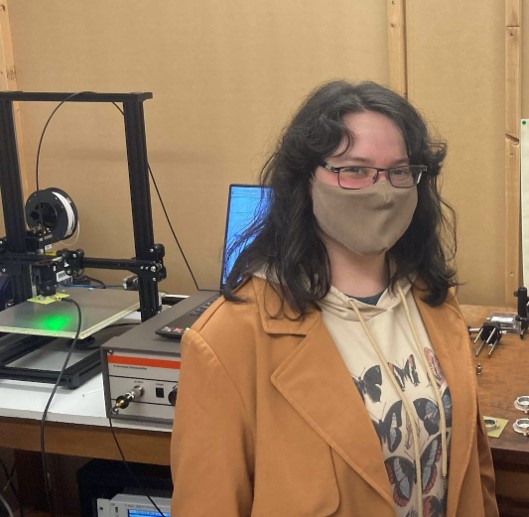
April 2022
Lab refurbishment preparations begin
Preparations begin with the refurbishment of two laboratories to house QSHS equipment in Sheffield. Watch this space for further updates.
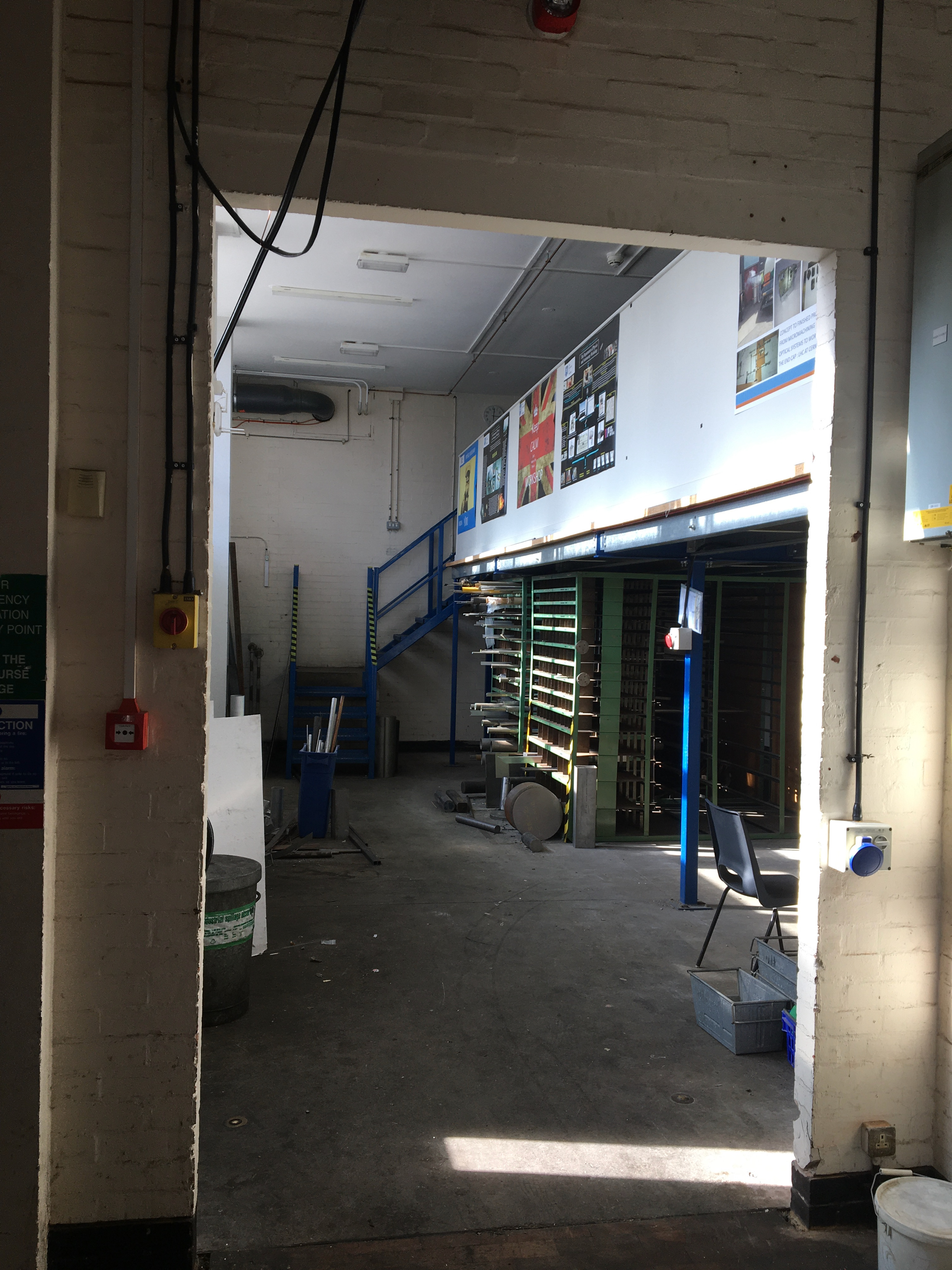
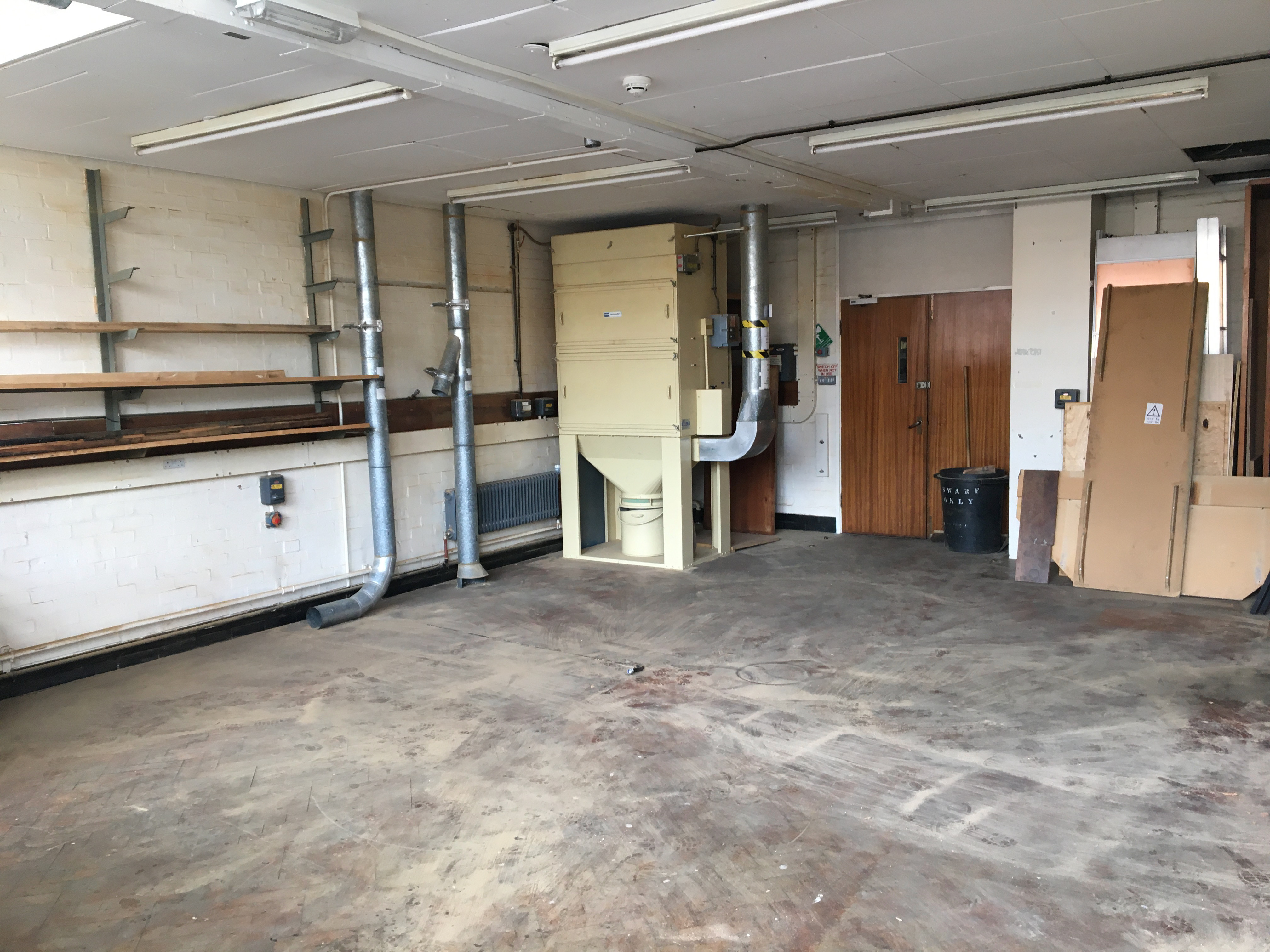
March 2022
QSHS Twitter account is launched
Follow us on twitter @info_qshs
STFC tweet the published paper by Professor Ed Daw IWAVE.
A pdf version of this paper is available here.
Postdoctoral Researchers join QSHS
Despite the pandemic we managed to recruit excellent and highly skilled PDRAs to the QSHS project in 2021/22. A warm welcome to all.
Paul Smith – Sheffield PDRA, previous experience: MICE target mechanism, instrumentation and electronics.
Bhaswati Chakaborty – UCL PDRA, previous experience: synthesis of transition metal dichalcogenides, 2D materials, nanocomposites.
Gemma Chapman – NPL PDRA, previous experience: silicon based quantum technologies, low temperature electrical measurements, on-wafer microwave measurements.
Mahesh Soni – Lancaster PDRA, previous experience: device simulation and fabrication, low temperature tests. Mahesh left QSHS in August 2022 to take up a position in industry; we wish him well for the future.
Michele Piscitelli – Oxford PDRA, previous experience: detection of microwave photons with qubits, nanoscale magnetic resonance.
Ningqiang Song – Liverpool PDRA, previous experience: particle phenomenology, with special focus on dark matter and neutrinos.
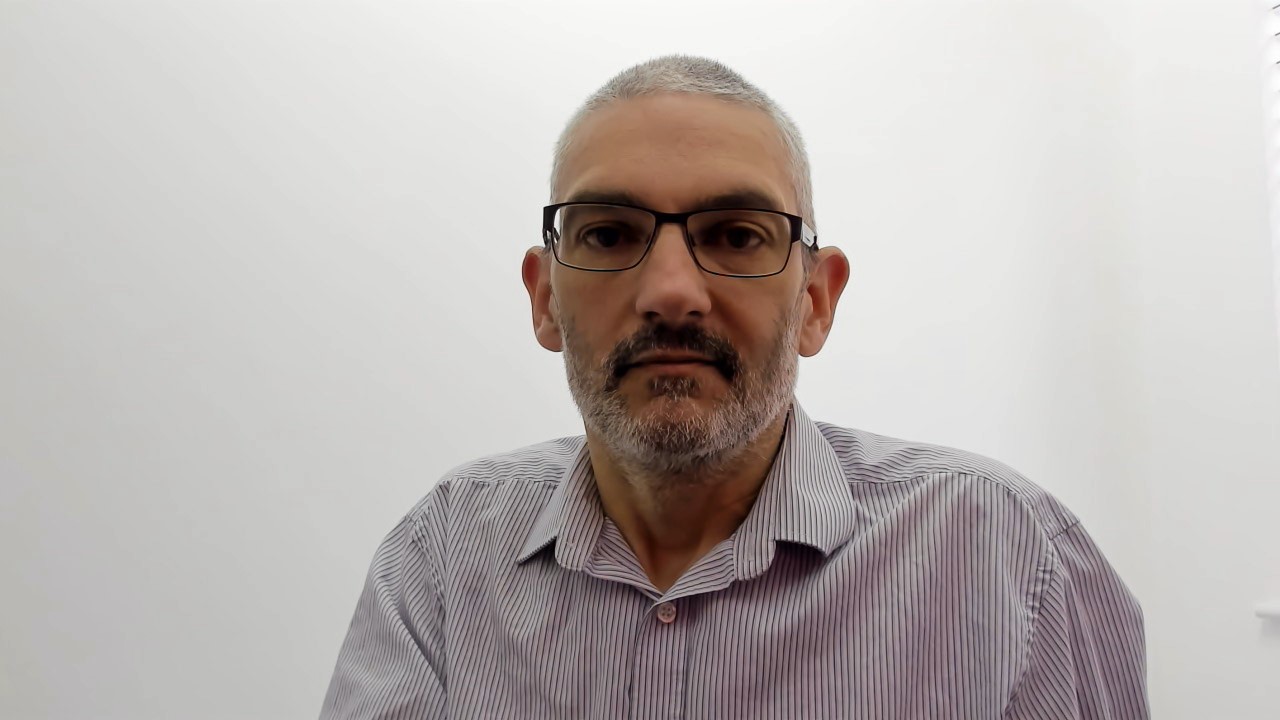
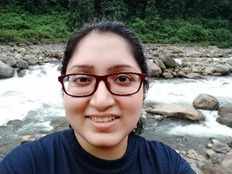
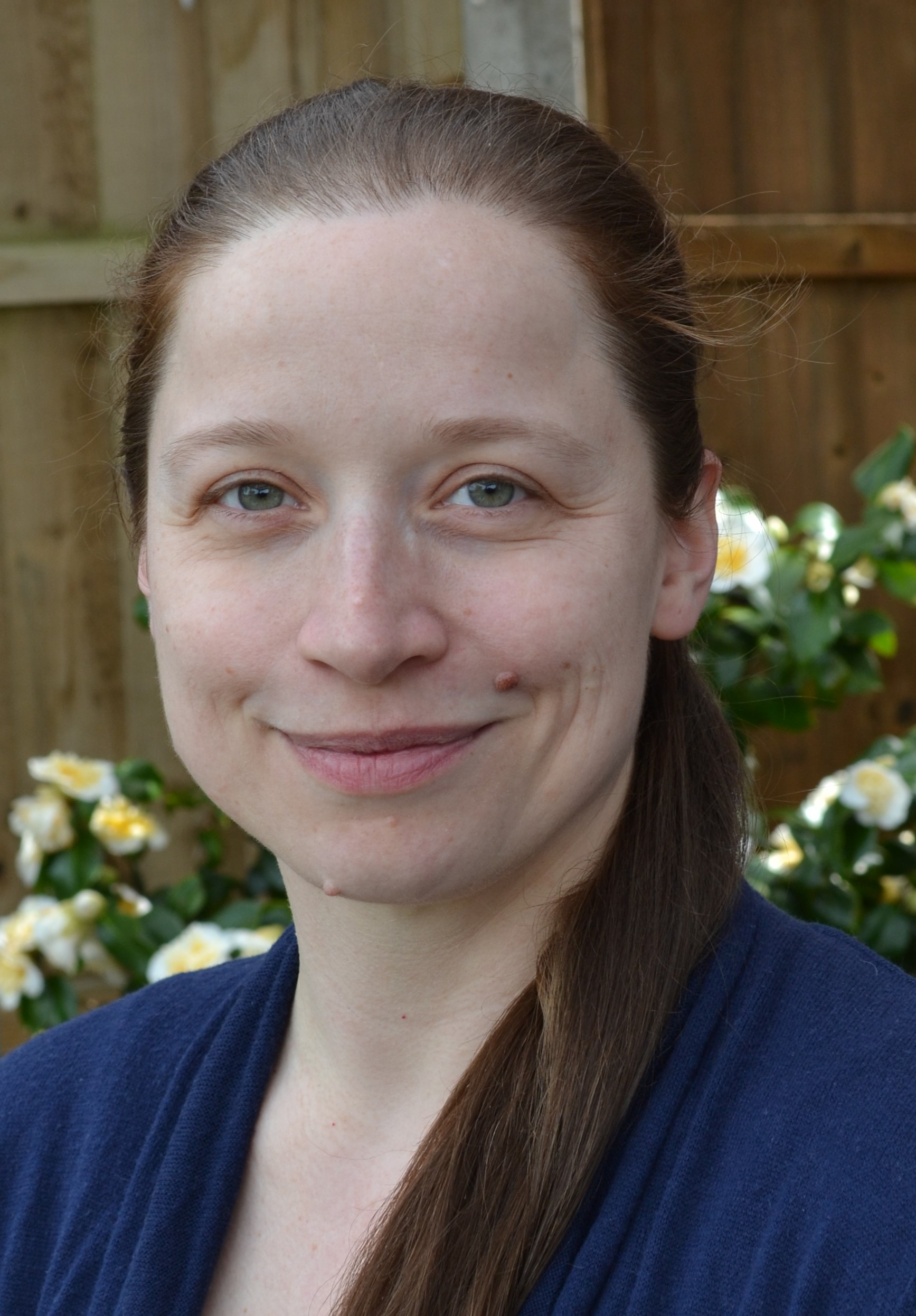

Future Leaders Fellowship awarded to Ed Hardy, University of Liverpool
We are delighted to announce that Ed Hardy has been awarded a prestigious Future Leaders Fellowship. We wish him well in his future endeavours. Read more about the Future Leaders Fellowship here.
January 2022
Angela Warren joins the QSHS collaboration as Project Manager. If you have any specific questions about the project, please contact Angela in the first instance by email at info@qshs.org
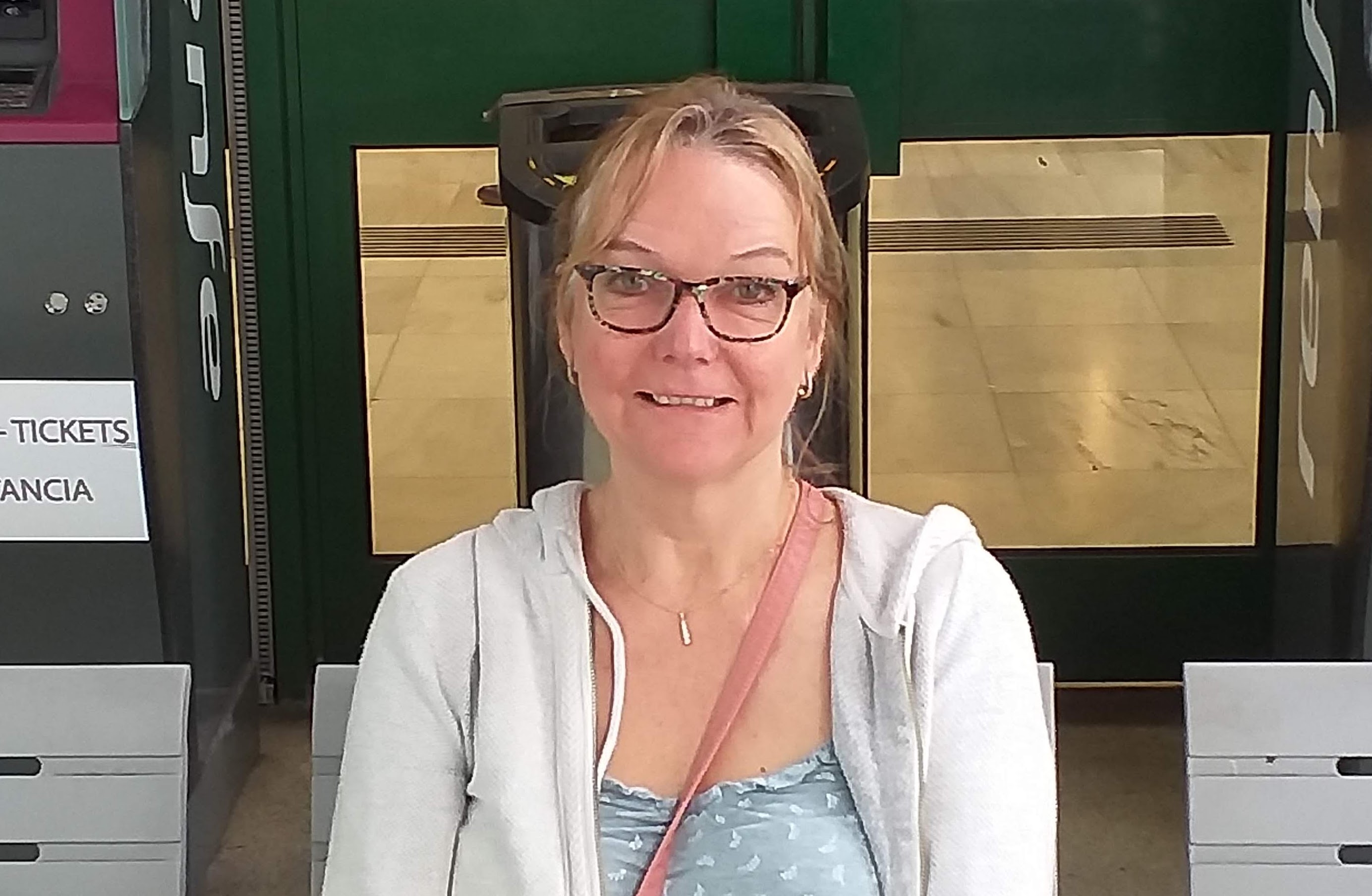
September 2021 – Press Releases
You can access the various press releases and coverage of the QSHS project, it’s funding and collaborators using the links provided:
Lancaster University, News, 13 January 2021. https://www.lancaster.ac.uk/news/2m-award-for-quantum-technologies-to-solve-the-mysteries-of-the-universe
UKRI Gateway, https://gtr.ukri.org/projects?ref=ST%2FT006811%2F1
University of Sheffield, 13 January 2021. https://www.sheffield.ac.uk/physics/news/university-sheffield-lead-multi-million-pound-project-which-could-open-new-frontier-physics
Cambridge Independent News, 22 January 2021, https://www.cambridgeindependent.co.uk/news/31m-quantum-technology-projects-involving-university-of-cambridge-will-open-up-new-frontier-in-physics-9148752/
University of Nottingham issued a press release on 13 January 2021: Quantum projects launched to solve universe’s mysteries https://www.nottingham.ac.uk/mathematics/news/2021/press-release-quantum-projects-launched-to-solve-universe%27s-mysteries.aspx
University of Liverpool issues news on 13 January 2021: https://news.liverpool.ac.uk/2021/01/13/quantum-projects-to-solve-universes-mysteries/
EurekAlert! AAAS 12 February 2021 https://www.eurekalert.org/news-releases/518425
UCL news 13 January 2021 https://www.ucl.ac.uk/quantum/news/2021/jan/quantum-technology-projects-funded-explore-fundamental-physics
University of Cambridge News, 13 January 2021, https://www.cam.ac.uk/research/news/quantum-projects-launched-to-solve-universes-mysteries
IPPP, Durham, Coseners Dark Meeting Quantum Sensing for the hidden sector See Slides Here
Royal Holloway News, 13 January 2021, https://www.royalholloway.ac.uk/about-us/news/royal-holloway-secures-funding-to-help-solve-mysteries-of-the-universe/
University of Oxford News, 13 January 2021, https://www.mpls.ox.ac.uk/latest/news/quantum-technologies-for-fundamental-physics-exciting-science-awaits
SPIE Quantum Technology: Driving commercialisation of an enabling science, 29 September 2021, 11881-18 https://spie.org/PXP/conferencedetails/quantum-technology-driving-commercialisation-of-an-enabling-science
QSHS Project Launch
January 2021
Quantum Sensing for the Hidden Sector (QSHS) is a collaboration of 8 UK research institutions just approved for funding by the Science and Technology Facilities Council (STFC) under the Quantum Technologies for Fundamental Physics (QTFP) scheme announced last October. The members are The University of Sheffield (lead institution, principal investigator Prof. E Daw), University of Oxford (co-I and senior project scientist Prof. Stafford Withington) previously at University of Cambridge, Lancaster University (co-Is Prof. Yuri Pashkin, Dr. Ian Bailey, Dr. Ed Laird) The University of Liverpool (co-I Dr. Ed Hardy), The National Physical Laboratory (co-Is Dr. John Gallop, Prof. Ling Hao), University of Oxford (co-Is Dr. Peter Leek, Prof. Gianluca Gregori, Prof. John March-Russell, Prof. Subir Sarkar, Dr. Boon-Kok Tan), Royal Holloway – University of London (co-I. Prof. Phil Meeson, Prof. Stephen West). The total award was £4.7M for the QSHS group and a further £0.9M for building a test facility to search for axion.
In collaboration with ADMX, incluidng: Seattle – Chelsea Bartram, Gray Rybka, Les Rosenberg, LLNL – Gianpaolo Carosi and PNNL – Jihee Yang.
QSHS aims to solve some of the most fundamental mysteries in modern physics using new technologies being developed for the rapidly expanding field of quantum measurement science. The fundamental mysteries are the dark matter problem and the underlying structure and symmetries of quantum chromodynamics, the theory of quarks and the nuclei of atoms. The dark matter problem is the observation that galaxies and the observable Universe are heavier than their observed constituents – stars, planets, dust and gas. The extra matter making up the difference could be made up wholly or partly of ultra-light particles – the so-called hidden sector particles that have so far evaded detection. The signatures of these particles are signals so faint that the worlds most sensitive measurement devices will be developed by our team for the search. In addition, we will build a UK based experiment to conduct the search experiment itself, and to act as a faculty for further experiments. The facility will include a high field large volume magnet to induce hidden sector particles to decay into detectable electromagnetic waves and a refrigerator capable of cooling the target to around 10 millikelvin – a hundredth of a degree centigrade above the absolute zero of temperature. Detection of hidden sector particles requires very advanced low noise electronics. Devices with names like Josephson parametric amplifiers, travelling wave parametric amplifiers and Qubit arrays will be developed by our collaboration to enable the search. These devices are also critical for progress in quantum measurement and quantum computing, areas where the UK has taken a world leading position through other schemes such as the quantum hubs funded by the engineering and physical sciences research council (EPSRC). The UK researchers of QSHS will form a collaboration with the U.S. based ADMX collaboration, who operate the most sensitive detector for a particular variety of hidden sector particle, the axion. The exchange of ideas with our U.S. partners and the work we can do together will strengthen the science of both the QSHS group and their U.S. counterparts. The discovery of hidden sector particle dark matter would be a momentous event in fundamental physics. The dark matter problem is now over 50 years old, but in addition a new set of light particles would be bound to solve some of the persistent problems with the standard model of particle physics. Furthermore, hidden sector particles may play other significant roles in physics, including in early Universe cosmology and the evolution of the Universe in the moments after it came into existence. We are excited to be embarking on this journey of discovery, and we hope the British public will share in this excitement as we start this research project.
January 2019
The first meeting of the collaboration was held on the 9th January 2019. Pictured from left to right: (front row) Stafford Withington, Ed Romans, Ling Hao, Ed Hardy. (back row), Xavier Siemens, Ed Laird, Mitch Perry, Ian Bailey, Yuri Pashkin, Stephen West. Photo taken by Ed Daw.
Since this first meeting the collaboration has expanded and new members have joined – refer to the People page.
